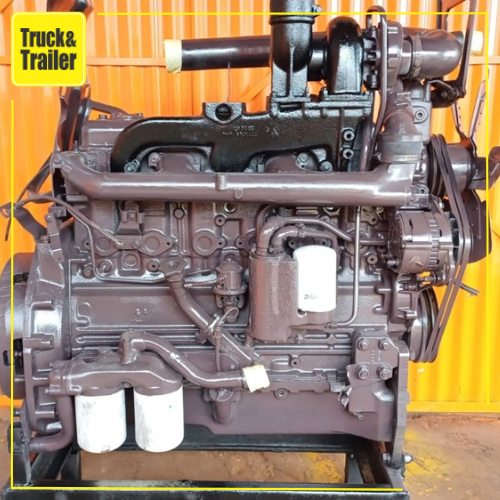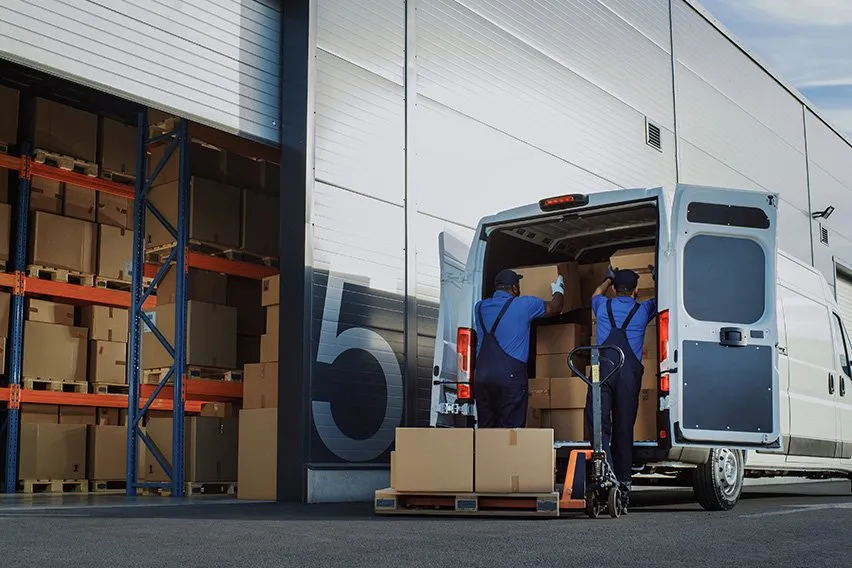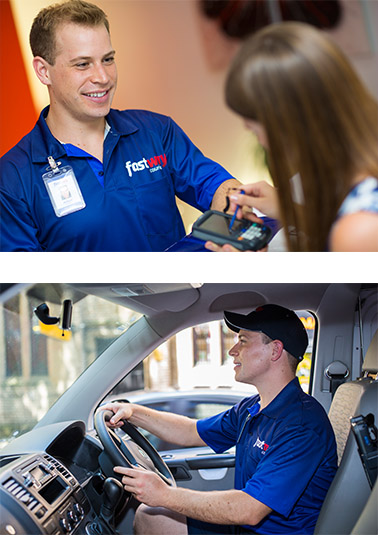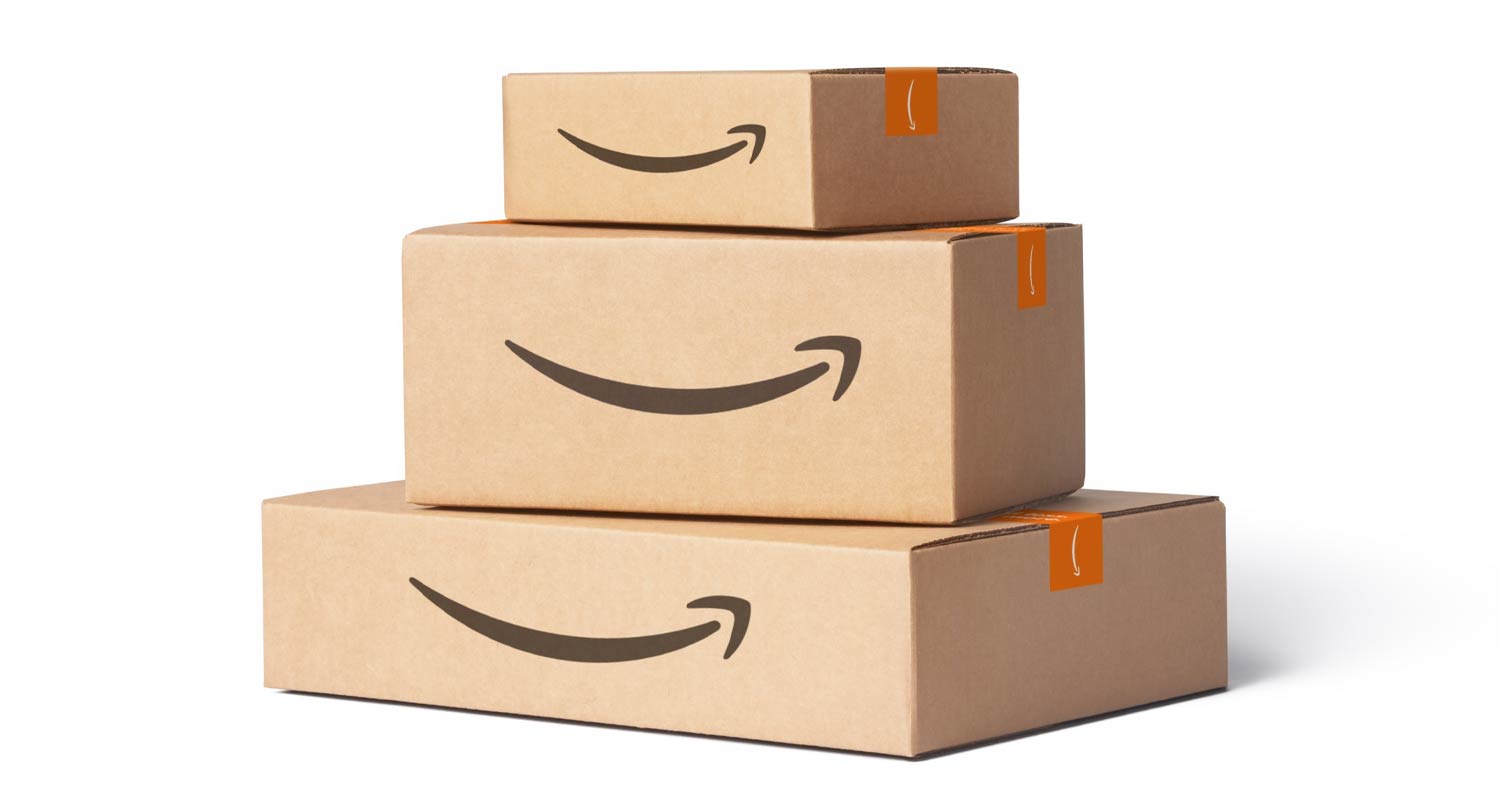

How to start a Courier service in South Africa

The courier service industry is thriving in South Africa, thanks to the country’s growing e-commerce sector and the need for reliable and efficient parcel delivery. If you’re considering venturing into the world of logistics and want to start your own courier service in South Africa, this article is your go-to guide. From understanding the market to securing the necessary licenses, we will walk you through the essential steps to kick-start your courier business successfully.
Step 1: Research and Planning Before diving into the courier industry, conduct thorough market research to understand the competition, customer demands, and potential areas of growth. Identify your target market segment and assess their specific needs. Plan your business model, including services offered, pricing structures, and target locations. A well-thought-out business plan will serve as your roadmap and increase the likelihood of success.
Step 2: Legal Requirements and Permits To operate a courier service in South Africa, you need to meet specific legal requirements. Here are the key steps to follow:
a) Register your business: Choose a suitable business name and register it with the Companies and Intellectual Property Commission (CIPC). Decide on your business structure, such as a sole proprietorship, partnership, or company.
b) Obtain necessary permits: Apply for an operating license from the South African Post Office (SAPO). This license ensures compliance with the Postal Services Act and allows you to operate legally. Additionally, register with the South African Revenue Service (SARS) for tax purposes.
c) Insurance coverage: Arrange adequate insurance coverage to protect your business, vehicles, and the items you transport. Consult with insurance providers to determine the best coverage options for your courier service.
Step 3: Infrastructure and Logistics Setting up a reliable and efficient infrastructure is crucial for a successful courier service. Consider the following:
a) Vehicles: Depending on your budget and operational requirements, choose vehicles suitable for delivering parcels in different sizes. Ensure your fleet is well-maintained and equipped with GPS tracking systems for effective route planning and monitoring.
b) Warehousing: If your courier service includes storage and distribution, secure suitable warehouse space to handle inventory management. Invest in a robust inventory management system to efficiently track and handle packages.
c) Technology: Embrace technology to streamline operations. Implement a user-friendly website or mobile app to facilitate online bookings, package tracking, and customer communication. Utilize software solutions for efficient logistics management, including route optimization, order tracking, and customer notifications.
Step 4: Staffing and Training Hire a competent and reliable team to handle various aspects of your courier service. Recruit drivers who possess valid driver’s licenses, clean driving records, and excellent customer service skills. Provide comprehensive training on safe driving practices, package handling, and professional conduct. Emphasize the importance of punctuality and reliability to ensure customer satisfaction.
Step 5: Marketing and Networking Develop a robust marketing strategy to promote your courier service and gain customers. Leverage digital platforms such as social media, search engine optimization (SEO), and online directories to enhance your online presence. Collaborate with e-commerce platforms, local businesses, and individuals who require regular courier services. Attend industry conferences, networking events, and trade shows to build connections and establish partnerships.
Starting a courier service in South Africa offers immense potential for growth and profitability. By conducting thorough research, obtaining the necessary licenses, setting up a reliable infrastructure, hiring competent staff, and implementing effective marketing strategies, you can position your courier service for success. Remember, in the highly competitive logistics industry, delivering exceptional customer service and maintaining operational excellence will be key to achieving long-term success.

Startup Mag
Related articles.

Centurion Law Group Rebrands As CLG

Sharon Beulich Emphasises The Imperative For Businesses To Adopt Sustainable Practices

SA StartUp Payfast Rebrands To Network International

Domains.co.za Highlights Which Businesses Are Ideal For A .click Domain Name
You are using an outdated browser. Please upgrade your browser to improve your experience.
- For business
- For advisors
- For brokers
- How to set up a courier business
Last reviewed on April 19, 2024
Reading time: 8 min
- SME support
- Swoop guides

Page written by Rachel Wait . Last reviewed on April 19, 2024 . Next review due March 1, 2025.

Powered by AiVOOV
If you’re considering starting your own courier business, it’s important to do your research first. Here’s our handy guide on how to set up a courier business and increase your chances of success.
Why start a courier business?
The COVID-19 pandemic and associated lockdowns have helped to contribute to a rise in demand for courier services as increasing numbers of people shop online and expect items to be delivered to their door.
On top of this, more people are choosing to buy and sell second-hand items on sites such as eBay and Vinted, which means more couriers are needed to deliver the goods.
However, the courier industry is also very competitive and you’ll be competing against the likes of D2D Couriers and MDS Collivery, along with the larger international firms such as TNT, DHL and Evri (formerly Hermes).
This means that if you’re thinking about launching your own courier company, you’ll need to carry out some research in your area beforehand to establish how you’re going to position yourself and stand out from the rest of the competition.
Key steps to set up a courier company:
Market research.
Your very first step is to carry out some thorough market research. You need to find out whether there is enough demand for another courier service in your area and how much competition there is.
Look at other courier businesses to work out:
- How much they charge and the type of services they offer
- Whether they focus on local, national or international deliveries
- Whether they operate a fleet of vehicles.
Then consider how you will stand out from the crowd. For instance, it might be that no courier in your area offers a 24-hour service and your business could fill that gap. Or perhaps you want to focus on offering a flexible and high-standard service to your customers who might want valuable items or important documents delivered promptly. As an independent company, you can focus on offering a personalised service with high-quality deliveries.
It’s also worth asking people in your area what they would like from a new courier service so that you can tailor it to their requirements. You could even ask how much they would be willing to pay for such a service.
There are a number of factors you’ll need to consider when choosing the most appropriate vehicle for your business. For a start, you’ll need to look for a vehicle that’s comfortable to travel in and one that’s reliable as you could be covering vast distances.
You will also need to consider the size of the vehicle. This is likely to depend on what you plan to deliver. You might want a fleet of vehicles or, if your primary concern is the environment, you could even consider a bicycle for short-distance drop-offs or an electric vehicle.
Bear in mind that if you plan to hire employees, they might be able to use their own vehicles but you’ll need to talk with your insurance company first.
Capital/funding
A major consideration when setting up your own business is how you will fund it. If you don’t have enough cash saved up yourself, you could ask family and friends whether they would be happy to invest in your business. This can be cheaper than taking out a traditional loan, but it can also put a strain on your relationship if things go wrong.
Another option to explore is a startup loan . This type of loan is specifically designed to help new businesses launch and expand. You’ll be given a lump sum of capital that you then repay in monthly instalments at a fixed rate of interest. To be eligible you must be at least 18 years old and live in South Africa, and your business must have been trading for no more than 36 months. You must also be able to prove that you were unable to obtain a loan from alternative sources and that you can afford the loan repayments.
Alternatively, if you need funding to help you acquire vehicles (or equipment) for your business, you could consider asset finance . Within this, there are three options to consider – hire purchase, leasing and contract hire.
Hire purchase requires you to pay an initial deposit for the vehicle and the remaining cost is then divided into monthly instalments, with interest added. Once the last payment is made, you’ll own the vehicle outright.
Leasing, on the other hand, requires you to rent the vehicle from a finance provider and then pay a regular fixed fee over a set term, with interest added. At the end of the term, you might be able to pay a lump sum to buy the vehicle or you can continue to lease it or cancel the agreement.
Finally, there’s also contract hire which is often used for new or nearly new vehicles. You set up a contract with a finance company and it will buy the vehicle you need and hire it to you over a set period. The company then takes back the vehicle at the end of the contract so you can acquire another new one with a fresh contract.
It’s important to choose your equipment carefully. Exactly what you need will depend on what you are going to be delivering and how you’ll be delivering it.
For example, if you’ll need to handle fragile goods, items that need to be kept within a certain temperature and perishable goods, you will need specialist equipment such as refrigeration units and gloves. Or if you plan to carry out deliveries on a bike or motorbike, you will need clothing that can cope with weather extremes and potential accidents, as well as hi-vis items. You might also need backpacks.
Another point to consider is the type of software and hardware package you’ll require. As part of this, you’ll need to think about:
- Online product management to keep invoices and accounts up-to-date.
- Warehouse management systems to record and track packages in and out of buildings – you could offer customers a live tracking link so they can follow the progress of their package.
- Smartphone apps to help drivers find the best route from A to B.
- SMS messages to let customers know when their package is on its way and when it’s been delivered. You could also include a feature to enable customers to change their delivery date or add a “safe place”.
Many insurance firms will offer dedicated courier insurance that will cover you to safely deliver goods to multiple drop-offs and on behalf of clients. However, policies won’t come cheap as courier drivers are considered a higher risk. After all, you’ll be making several stops, facing tight deadlines and potentially driving on unfamiliar roads for long periods of time.
Other insurance policies to consider include:
- Goods-in-transit insurance: This will protect the items you’re delivering against damage and theft (it might be included in your courier insurance policy).
- Breakdown insurance: This will help you get back on the road in the event your vehicle breaks down mid-journey.
- Fleet insurance: This is a specialist insurance policy for businesses with two or more vehicles in the company. It can work out cheaper than individual insurance and you can usually insure different makes and models under the one policy.
- Public liability insurance: This will cover you if you’re taken to court because your business activities have caused damage to someone’s property or resulted in injury. It can cover your legal costs and any compensation you might have to pay.
- Employer’s liability insurance: If you hire staff, this will cover you for compensation claims if an employee becomes ill or is injured because of the work they do for you.
If you want to hire employees to join your courier business, they will need a clean driving licence. Hiring people with good communication and organisational skills will also be a bonus for your business. Many drivers are self-employed which means they are often contractors rather than full-time employees. They should also be happy to work evenings and weekends and be comfortable driving long distances.
Like what you see? Share with a friend.
Clever finance tips and the latest news
delivered to your inbox, every week
Join the 70,000+ businesses just like yours getting the Swoop newsletter.
Free. No spam. Opt out whenever you like.
By subscribing, I accept the privacy-policy and I give my consent to receive Swoop Funding e-mails about the latest updates and offers.
Rachel has been writing about finance and consumer affairs for over a decade, helping people to get to grips with their finances and cut through the jargon. She's written for a range of websites and national newspapers including MoneySuperMarket, Money to the Masses, Forbes UK, and Mail on Sunday. Rachel has covered almost every financial topic, from car insurance and credit cards, to business bank accounts and mortgages.
Swoop promise
At Swoop we want to make it easy for SMEs to understand the sometimes overwhelming world of business finance and insurance. Our goal is simple – to distill complex topics, unravel jargon, offer transparent and impartial information, and empower businesses to make smart financial decisions with confidence.
Find out more about Swoop’s editorial principles by reading our editorial policy .
Related pages
- 10 reasons why you need a business bank account
- Are you one of the businesses threatened with closure because you cannot access funding?
- Business models: Types, examples, and how to design one
- Checklist for buying a business
- Debtor Days: All you need to know
- GenAI: the tools and prompts your business needs
- How to boost cash flow
- How to build a property portfolio
How to buy and open a franchise
- How to calculate EBITDA
- How to calculate liquidity
- How to calculate market size
- How to calculate profit
- How to calculate the cost of debt
- How to complete a VAT return
- How to create a business PayPal account
- How to create a marketing strategy for your business
- How to do a stocktake
- How to do a SWOT analysis
- How to download a bank statement
- How to file company accounts
- How to finance a new business
- How to finance property development
- How to forecast cash flow
- How to get a business loan
- How to get a business loan with bad credit
- How to get a business mortgage
- How to get an EORI number
- How to get funding for a new business
- How to get venture capital funding
- How to manage cash flow
- How to pay off a cash advance
- How to pitch a business idea
- How to promote your business
- How to reclaim VAT
- How to refinance a business loan
- How to run a successful business
- How to scale a business
- How to sell a percentage of your business
How to set up a cleaning business
How to set up a limited company
How to set up an online business
- How to start a buy-to-let business
- How to start a property management company
- How to value a business
- How to write an invoice
- Resolutions for 2024: Don’t do more – do what you do better
- Small business bookkeeping: The complete guide
- Soft asset finance: What you need to know
- Swoop Funding empowers South African businesses with official launch
- Three strategies to hiring the A-team your startup deserves
- Why did my credit score drop?

18 Soho Square, W1D 3QH, London, UK
Suite 42, 4th Floor, Oriel Chambers, 14 Water Street, Liverpool, L2 8TD
Kingfisher Way, Silverlink Business Park, Newcastle upon Tyne, NE28 9NX, UK
Suite 105A, Airivo, 18 Bennetts Hill, Birmingham, B2 5QJ
Aberystwyth
Aberystwyth Innovation and Enterprise Campus Gogerddan Campus Aberystwyth University Ceredigion SY23 3EE
Dogpatch Labs, The CHQ Building, Custom House Quay, Dublin, Ireland
Suite 801, Level 8, 84 Pitt Street, Sydney, NSW 2000, Australia
180 John St, Toronto, ON M5T 1X5, Canada
43 W 23rd St, New York, NY 10010, United States
21 Dreyer Street, Cape Town, South Africa, 7708
Join the 70,000+ businesses just like yours getting the Swoop newsletter. Free. No spam. Opt out whenever you like.
close Cookie Preferences
We use necessary cookies to make our site work. You can change your cookie settings in Cookie Preferences
Our use of cookies
We use necessary cookies to make our site work. We'd also like to set optional third-party cookies to help us improve the experience. Using this website will set a cookie on your device to remember your preferences. For more detailed information, please see our Cookie Policy
Necessary Cookies
These are cookies that are set by Swoop necessary for our website to function.
View all Swoop cookies
Third Party Cookies
These are services that are set by Third party companies in order to help us to understand and improve our website, remember preferences and to display advertising.
View all Third Party Cookies
We require some cookies for the operation of our website, which do not gather information about you that could be used for marketing or remembering where you have been on the internet.
For more detailed information visit our Cookie Policy
These cookies help us to improve our website by collecting and reporting information on how you use it. The cookies collect information in a way that does not directly identify anyone.
- Google Tag Manager
- Starting a Business
- Growing a Business
- Small Business Guide
- Business News
- Science & Technology
- Money & Finance
- For Subscribers
- Write for Entrepreneur
- Entrepreneur Store
- United States
- Asia Pacific
- Middle East
- South Africa
Copyright © 2024 Entrepreneur Media, LLC All rights reserved. Entrepreneur® and its related marks are registered trademarks of Entrepreneur Media LLC
7 Steps To Starting A Transport And Logistics Business Logistics is a big game both locally and internationally, because everything we use daily has been shipped and delivered across various destinations before it's sold and put to use. This is where you can cash in.
By Diana Albertyn • Jul 22, 2019
You're reading Entrepreneur South Africa, an international franchise of Entrepreneur Media.
Thinking of starting your own transport and logistics company? While getting into the industry is not difficult, staying successful as a trucking company can be challenging if your business plan, finances and recruitment strategy aren't solid from day one.
Whether you're starting off with a bakkie or a minibus, you need to ensure you're prepared for high competition because of the transport and logistics industry's low barrier to entry.
Why should I start a transport and logistics company?
Aside from the ease of access into the industry, you don't need much capital to start off with – but you will need to do your homework. This is the only way you'll build a sustainable business.
"In many instances the entrepreneur starts these businesses with little to no capital, relying instead on revenue derived from the business to cover all overheads from day one," according to BizConnect . "Seek out customers and contracts before you start the business because transport contracts don't magically appear later on."
Related: Driving Profits In Transport
Now that you've established the kind of market you'll be entering into, how do you go about starting your own logistics company? These are some of the top questions you should be asking before starting a freight company:
1. What costs do I need to consider when starting a transport company?
You don't need to be a numbers genius, but a basic understanding of finances is helpful when launching any kind of start-up.
- First, you'll need to establish where you're going to source capital to get your transport business started. There are multiple options including the bank, investors and bootstrapping.
- Next, you need to consider the specific expenses associated with the logistics industry, for example the licence and toll expenses, aside from maintenance, fuel and driver skills development training costs.
- Although you haven't started running your transport and logistics company yet, you need to consider operating costs and maintenance expenses when drawing up your budget. The latter is crucial for providing reliable service to customers as you must deliver the excellence you will market to them. While marketing may not seem important at this stage, it's important to budget for this expense as your company grows.
- Remember that besides all the above costs, you'll require money to keep your vehicles safe when they aren't in use and when they are on the road. Invest in a secure location and other security features, such as trackers.
- Lastly, you're going to need to pay your drivers and other staff salaries on a monthly basis, so factor in that expense when budgeting for your transport and logistics business.
2. What should I look out for when buying my first fleet of trucks?
Choosing the right vehicles for your transport and logistics company means your drivers will have the right vehicle for the job. This leads to efficiency and speed of service.
Related: Benji Coetzee Never Worked In Logistics, Find Out How She Launched Empty Trips A Successful Logistics Marketplace
"Seeing someone driving a small van to deliver a huge load will make your company look unprofessional, as will using large bus trailers to carry minimal cargo," say experts in the truck and trailer industry.
Establishing what vehicles you need now will help you have a clearer idea of how much truck finance to apply for when you approach banks for transport financing options . This information helps structure your repayment plan and set your interest rate more accurately. You will be able to budget your finance accordingly.
Experts recommend investing in a long-haul truck for larger cargo and longer trips. Babcock International , for example, has vehicles that will meet this need, although the cost is slightly higher than an average-sized truck.
If you're already considering new vehicles instead of preowned trucks for your business, you'll benefit from a full warranty and service plans.
Related: 10 South African Entrepreneurs Who Landed Funding – And How They Did It
Once you've established how much you're able to spend on your fleet, start considering the available models for your business's specific needs.
"An important aspect to consider is what the vehicle will be used for. Now, this might sound simple, but it is an aspect that is often overlooked by many fleet owners. You need to have an idea in mind about what the vehicle will be used for before you can go to a dealership." – Truck & Freight
There vital aspects to consider when choosing your logistics vehicles are:
- What types of supplies you will be carrying
- The volume of supplies you will be carrying
- The types of terrains you will be driving over.
Courier companies will require different vehicles from moving companies, for example. Your idea of the ideal vehicle for your type of transport and logistics company may have to be adjusted based on the amount of finance you qualify for or how much capital you have managed to allocate to purchasing of vehicles for your fleet.
Related: How To Keep The Wheels Turning For Your Transport Business
You may need consider viable alternatives to find the right vehicle. So, list features like safety, comfort and condition instead of looking for brand names and the latest models. "Being open to different vehicles is the key to a successful fleet vehicle purchase," experts advise.
3. How can I get truck finance for my transport and logistics company?
Regardless of how vehicles are paid for, the cost of financing a transport and logistics business is the biggest expense you will have to manage.
Make sure you do your homework and understand the different options available when it comes to paying for vehicles. You can consider the following options:
- Financial lease and extended rental agreements, where the use of vehicles is funded from revenue, no upfront payment is required, but the ownership remains with the lessor;
- Instalment sale where a small amount relative to the total purchase price is paid as a deposit, your instalments are fixed, and you own the vehicle at the end of the term.
Related: How To Service Customers Through Reverse Logistics
Remember to factor in the running costs of operating a logistics company, such as maintenance and wear-and-tear. These expenses should be included when considering the amount of finance needed to launch and sustain your transport and logistics company.
Before approaching a financial institution for financing, devise a budget and calculate your affordability.
4. Where can I find training to help me start a transport and logistics business?
The Road Traffic Management Corporation provides regulated, professional training courses such as a National Certificate in Freight Handling. Contact TETA for a list of accredited training institutions.
The Department of Public Transport , Roads and Works is responsible for the issuing of operating licenses.
Related: A Free Business Plan Example to Launch Your South African Business
A National Certificate in Professional Driving is a valuable qualification that equips owners and managers with a variety of capabilities. It's advisable to look for a qualification that has been accredited by the Transportation and Training Authority.
Remember that according to South African law, any vehicle on public roads needs to be deemed roadworthy by an official testing station. The roadworthiness test checks the following aspects of the vehicle:
- Identification and documentation
- Electrical systems
- Fittings and equipment (including mirrors, safety belts etc)
- Braking system
- Wheels (including tyre condition)
- Suspension and undercarriage
- The steering mechanism is in order
- Exhaust system
- Transmission
- Instruments
- Vehicle dimensions.
5. How do I employ drivers to work for my transport business?
The key components of your business, besides your vehicles, are your drivers. Your drivers need to obtain the relevant licenses before they can be considered legal to operate vehicles in your transport and logistics business.
Related: 5 Different Types Of South African Business Structures
Avoid issues later on, with the law and your customers, by ensuring you're recruiting qualified and experienced drivers at launch and as your business needs grow. Not only do quality drivers boost productivity, but your reputation is elevated when your clients know they can rely on your staff.
Invest in excellent employees and avoid setting the bar as low as the ability to drive and follow directions. Your drivers will need the relevant driver's licences for different trucks and require training to handle driving in hazardous situations, like storms and heatwaves.
"Know how to deal with staff, and understand all of the shortcuts in the areas they'll be delivering to," advises Business South Africa . "They will also require excellent communication skills to relay messages about their whereabouts."
6. Where do I find customers for my logistics company?
As mentioned earlier, everything around us needs to be delivered from point A, to point B. So, while it may seem that jobs are scarce and getting business is difficult in the beginning, avoid grabbing the first opportunity to get your first client.
Related: Seed Capital Funding For South African Start-Up Businesses
It may sound counterintuitive to let chances at getting the wheels turning pass by, but, it's important to assess whether it's worth your while or not. Proper planning is essential so it's advisable to avoid ad-hoc business.
Remember that all you need to get customers' attention is a computer, a smartphone and an Internet connection.
"Technology centred around cargo has advanced dramatically over the years, and as have the expectations of customers. Most large companies allow clients to book and track all of their parcels or deliveries online." – Business South Africa
The best part is that, not only is getting word about your transport and logistics coming out there inexpensive, it's also relatively easy and quick.
Related: Your Free Business Idea Evaluation SWOT Analysis Template
Embracing technology doesn't mean setting up an elaborate website, but you do need to ensure that your customers can track their deliveries and reach you quickly if they need to. Perhaps you should implement an SMS notification system so clients can track their orders at the touch of a button.
Ensure your system is accurate when it comes to ETA for deliveries and any delays on delivery, giving clients peace of mind about using your service and the confidence to recommend you to others.
Your service needs to be as simple and convenient to use as possible.
7. How do I get suppliers to add my logistics company to their books?
The best way to get noticed and acquire regular business is by being reliable from day one. People like that. They notice and appreciate good service and when you start your transport business, it's a good reputation to have.
Related: 2 Simple Ways to Keep Your Startup Growing
When a business decides to make use of your transport services, they need to be sure that you won't let them down . Satisfied customers value trustworthy service and it's easier to retain existing clients when you offer quality service. It also helps that good customers can encourage new business through recommendations.
Despite the many challenges that come with running a successful transport and logistics business, customers like to know that you're giving of your best and consistency is key to build loyalty from these companies.
It's advisable to start out with logistics you're best qualified to handle and work your way from there.
If you have experience with smaller items, start there, but if you intend to eventually expand your portfolio to include other specialised services, acquire as much comprehensive knowledge as you can, while building a strong set of connections in relevant regions across the industry, and possibly the country as well.
Related: Treat Yourself as a Client for Startup Success
Entrepreneur Staff
Sales Enablement: Content Developer
Most Popular Red Arrow
The sweet side hustle she started in an old cvs made $800,000 in one year. now she's repeating the success with her daughter — and they've already exceeded 8 figures..
Mother-daughter team Elisabeth and Gina Galvin are taking their snack brand Stellar Snacks to new heights, literally — you've probably seen their products in-flight.
10 Ways to Use AI for Hyper-Personalized Marketing
The future of marketing is not just about privacy and personalization. It's predictive, proactive and powered by AI.
Exploring How Virtual Reality is Changing Startups
Virtual reality's immersive environment is where startup marketing is headed, and early adopters will be the ones who profit.
Building an Agile Remote Team Is No Easy Feat — But It's About to Get a Whole Lot Easier Thanks to This Transformative Tool.
The virtual reality of the metaverse promises to put a radical new spin on returning to the office.
7 Ps of Marketing and How They Apply to Your Marketing Mix
Looking for picture perfect marketing formulas that will likely outlast and adapt to any trend? Read on.
Are You Hesitant to Use AR Technology? Here's Why You Need to Jump on It Now.
Many people are still hesitant to use augmented reality. Why? Let's figure it out together.
Successfully copied link

how to start A courier service business in south africa
The first thing you need to do is create a business plan, you need to have a clear idea of how you will make money and what type of courier business you’re looking for. Once you understand this you should start planning your expenses, pricing and profit margins. How to write a business plan
Gather the necessary equipment.
You’ll need some basic, physical goods to start a courier business.
- Decide on vehicle types. You may hire employees who are willing to provide their own transportation as long as their cars are able to pass certain tests to assure they’re running properly. However, if you’re transporting bigger items you may need to use large, cargo trucks. You will have to provide these types of vehicles to your employees.
- Cell phones, clipboards, maps, and GPS systems are also important for a courier business. If you want your employees to wear uniforms, keep this in mind as well.
What are the ongoing overheads in a courier service business?
One of the most important things to do in order to run a successful courier company is to understand your costs. Don’t take short cuts and remember quality controls and stringent maintenance to vehicles is crucial.
Besides capital outlay for equipment and vehicles, other expenses have to be considered:
- Garage or other facilities for vehicles stored at business premises
- Additional security features, such as immobilisers and tracking equipment
- Routine servicing and maintenance of vehicles
- Repairs for scratches, wear and tear (tyres) or accident damage
- Parking costs incurred for business use
- Toll charges incurred for business use
- Accounting/invoicing
- Traffic fines
- Marketing and advertising programmes
- Salaries and benefits for staff
- Roadworthiness – by law, any vehicle using South African public roads has to be roadworthy. The responsibility of scheduling and taking a vehicle in for roadworthy testing rests solely on each individual vehicle owner.
Create a website for your business courier service. Place your website on all business cards, fliers, brochures and advertising materials. Create a business page on the following social netwoks “facebook, twitter and linkedin “. Most courier businesses will need to market to other businesses who are looking for a courier. This can be done by making a list of businesses that may need a courier service and then cold calling and emailing prospects to let them know about your new service. Online marketing and advertising can also be a low cost and effective way to target business owners. Google Adwords and Facebook both have easy to use self serve platforms. You can target customers based on keywords they search for or their interests/demographics/location. Craigslist can be a great resource to post free ads to let people know about your local courier business.
Insure Your Business
Courier business owners should always consider the appropriate type of insurance to protect your business in case of an accident. In the courier business you will need insurance for your vehicle, cargo insurance and possibly liability insurance as well. Having an insurance policy is also essential for building trust with customers. Many businesses and individuals will avoid working with a courier service that is not properly insured. Contact a local commercial insurance broker to find out how much it will cost to insure your business. This cost may vary based on location, types of deliveries you make, and the perceived risk.
Call competitive delivery or courier services in your area. Obtain their rates for various package sizes, client types and mileage, if applicable. Price your services comparable to these other courier businesses.
Where to find training to help you start
The Road Traffic Management Corporation provides regulated, professional training courses such as a National Certificate in Freight Handling.
SME Starter Kit
The Road Freight Association of South Africa (RFA) offers an SMME Starter Kit specially designed for Start-up Business which includes hints and tips on how to get into the transport industry, how to source contracts, how to calculate financial projections and other important information. Find it here .
Register Your Business Name
Your business name plays a role in almost every aspect of your business, so you want it to be a good one. Once you have chosen a name for your business, you need to register it. Click here for a step by step guide on how to register your business
Financing your business?
You can finance your courier service business by any or all of the following ways:
- Fund your startup yourself.
- Pitch your needs to friends and family.
- Applying for a Business loan
- Finding your business through crowdfunding
- Apply to local angel investor
You can also consider buying a courier franchise
Why buy a franchise? A franchisor will train you up in executing a proven formula, provide ongoing support and run marketing campaigns, while you will benefit from a degree of brand recognition and trust.
Other potential benefits to joining a courier franchise – should you choose wisely – include:
- Low start-up costs – premises rarely needed
- Relatively simple business model
- Experience in courier sector rarely required
List of courier franchise opportunities
- Fastway Courier service franchise
- Kids Courier Franchise Opportunities
Business Ideas in south africa
Financing your Equipments: Apply in minutes and receive funding in hours. No paperwork, no hidden fees and no branch visits.
Is the anything in particular that you would like to know? If, yes, please free to ask below. W are always there to help, 24/7
[mwai_chatbot_v2]

How To Start A Courier Business In South Africa
Since the introduction of the industrial revolution, the courier business has been controlling transactions between customers and wholesalers or retailers. Therefore this article comes to enlighten our readers about how they can start a courier business in South Africa.
So, we strongly implore you to keep reading because the needed information that can assist you in running and executing your courier business plans is detailedly discussed below in this guide.
The courier business acts as a bridge between customers and manufacturers, wholesalers, or retailers by performing delivery services on behalf of a point of purchase to the purchaser for a commission.
The technological breakthrough in e-commerce businesses has heightened the demand for the courier service, making the courier business one of the most lucrative businesses to ever venture into around the world.
The following chapters of this article are the needful information that will guide you through the courier business:
Table of Contents
What You Need To Start A Courier Business In South Africa
The following are the basic requirements that you’ll have to meet to start your courier business in South Africa:
1. Business Plan: a good business plan that covers every aspect of your business and falls within your financial capabilities is required, and know that your business plan is a determinant to your success. Therefore a careful strategizing of a business plan has to be conducted
2. Business Location: learn how to spot a good business location that has easy access to clients with no delays
3. Leasing Office: deposit to the office owner to acquire the legal documentation of renting the office for the number of periods you negotiated
4. Market Research: conduct extensive market research into the courier business. Your research must reveal to you where the business is in demand and the type of services clients want and why they want it
5. Target Market: it is advisable to know your target market. The group of people you’re targetting must be known to understand the kind of services they mostly request, and this will help you determine the kind of services you can offer to the courier market
6. Business Name: choose a catchy name that is easy to memorize and describes your courier business
7. Business Registration : Register your business with the Companies and Intellectual Property Commission (CIPC) for a legal business certification
Also, for your tax registration, contact the South African Revenue Service (SARS) 8. Business Materials & Equipment: purchase the necessary courier service materials such as:
Two-way radio
Office supplies (envelopes, pens, pencils, notebook)
Computer software
9. Type of Services: after researching the market and knowing your target market, you’ll be presented with the high-demand type of service wanted by the market, and it is advisable to choose a service that you’ll be able to deliver with no challenges.
The following are a list of courier services you can choose from:
Standard delivery service
Express delivery service
Overnight Shipping services
Parcel delivery services
Luggage delivery services
10. Pricing: strategize affordable pricing for your courier service. Placing your service price too high will drive customers away, and too low pricing will affect your business and might shut down your business.
Therefore, there’s the need to make inquiries into pricing by contacting available courier services in the market to help get enlightened about the price range.
11. Branding: build a good business brand that stands tall among others, a business brand that gives potential clients a reason to trust the efficiency of your delivery service is required
12. Staffing: employ hard-working staff who are willing to give out their best towards your business for a commission
13. Staff Payment Plan: build a payment plan that can keep staff on their toes any time job calls, and the payment plan must be supportive to your business to keep it running.
14. Advertisement Plan: advertising your business is one key tool used to attract customers from every corner of the country and choose an efficient and affordable way of advertising.
The following are some of the advertising platforms to sell your business to the South African public:
Business website
Social Media
Local Newspapers
Sharing of business cards and flyers
How Much Does It Cost To Start A Courier Business In South Africa
The cost involved in starting a courier service business in South Africa differ depending on the type of services you wish to offer and how big or small you want to start, but an estimation of a courier business startup cost may range around R50,000 – 500,000.
Is The Courier Business Profitable In South Africa
The courier business is very lucrative in recent times, with much credit from the emergence of e-commerce businesses where customers wish to stay at home and order goods and choose a delivery plan to be delivered to their doorsteps.
So, the courier business is always in demand, and demand is said to surge higher due to the technological breakthroughs in Business-To-Customer (B2B) services.
Best Places To Start A Courier Business In South Africa
Below are some of the best places to start your courier business in South Africa:
1. In Cities
2. Communities with high internet literacy
3. Commercial areas
4. Business centers
5. Market centers
6. Industrial areas
How To Make A Courier Business Successful In South Africa
To run a successful courier business in South Africa, consider the following factors:
1. Good customer relationship
2. Good customer service
3. Delivering on time
4. Deliver what was ordered
5. It takes hard work and determination to be successful
6. Don’t settle for setbacks because they happen in every business, rather locate the challenges and find a solution to make a fair share out of the courier market
Challenges In The Courier Business In South Africa
The following are some challenges faced in the courier business in South Africa:
1. High competition from successful courier businesses
2. Tracking challenges
3. High delivery cost
4. Damage to delivered goods
5. Wrong drop down address
6. Difficulty in managing multiple customers
Benefits Of Setting Up A Courier Business In South Africa
Below are some of the benefits gained om setting up a courier business in South Africa:
1. Handsome profit income made by investors and employees
2. Generates income for the government
3. Job creation
4. Has improved the business aspect of life
5. Purchasing and delivery made easier
That is the information we can provide on how to start a courier business in South Africa.
Leave a Comment Cancel Reply
Your email address will not be published. Required fields are marked *

Courier Services Business Plan – Download
Become a South African delivery leader with SmatBiz’s Courier Services Business Plan. Attract clients, dominate the market, and deliver exceptional service. Downloadable PDFs, Word & Excel files. Start delivering profits today!
- Description
- Reviews (0)
Courier Services Business Plan – Become the Delivery Leader
Navigate the fast-paced world of courier services with SmatBiz’s Courier Services Business Plan. Crafted for the South African market, this roadmap empowers you to:
Master the Delivery Maze:
- SEDA & DOT compliant: Operate smoothly within regulations and secure funding with confidence.
- Efficient logistics & operations: Design optimal routes, utilize technology, and manage resources effectively.
- Robust risk management: Implement protocols to ensure cargo safety and client satisfaction.
Cater to Diverse Needs:
- Offer various service options: Express, same-day, overnight, international, and specialized deliveries.
- Target specific industries: Partner with e-commerce businesses, legal firms, medical facilities, and more.
- Flexible pricing structures: Cater to diverse budgets and delivery requirements.
Build a Delivery Empire:
- Data-driven 5-year projections: Showcase your potential for sustainable growth and profitability.
- Targeted marketing campaigns: Reach potential clients through online and offline channels.
- Build a trusted brand: Cultivate a reputation for reliability, speed, and excellent customer service.
Leave the planning complexities behind and focus on delivering excellence. SmatBiz’s downloadable PDFs, Word documents, and Excel files make launching your courier business a breeze. Plus, enjoy ongoing support from our logistics experts to refine your plan and navigate any challenges.
Invest in a connected future and build a thriving courier business in South Africa. SmatBiz’s Courier Services Business Plan is your roadmap to success, satisfied clients, and a flourishing bottom line.
Contact us for more info about this plan
There are no reviews yet.
Your email address will not be published. Required fields are marked *
Your review *
Save my name, email, and website in this browser for the next time I comment.
Related products

Car Fitment Business Plan – Download

Auto Spare Parts Business Plan – Download

Driving School Business Plan – Download
We offer comprehensive business support services for small businesses in South Africa. Get expert assistance from Smatbiz Services.
Important Links
Customer Support
Terms of Service
- 065-643-3410
- [email protected]
- 29 Wallace St, Goodwood,
© 2023 Powered by SmatBiz Services.


How To Start Courier Business In South Africa
What is Courier Service?
A courier is a company, an employee of that company or a person who delivers a message, package or letter from one place or person to another place or person.
1. Choose The Right Vehicle
To start your courier service you will need a reliable source of transportation to deliver packages. Many full-time couriers choose cargo vans for this type of delivery service as they provide the largest amount or cargo space to transport the items that you are carrying for customers.
If you don’t know much about buying a cargo van you can read some reviews for the 2020 models here. If you want to lower your monthly payments we suggest trying to lease a van or you can shop for a used cargo van. Alternatively, a pickup truck with a covered bed can also be a good option.
2. Buy The Right Equipment
Having the right equipment will make your courier delivery business more efficient and save your back from the pain of carrying boxes. The type of equipment that you need will depend in part on the types of items that you will pick up and deliver for your customers.
If you are mostly delivering parcels or boxes a simple dolly or hand truck is essential. You can buy a standard dolly for about $20 at major retailers like Home Depot, Lowes, or Target or you can buy moving equipment online here and have it delivered through Amazon. Other items you may need include cargo straps, moving blankets, and tape.
3. Name Your Business
The name you come up with is representative of your business values and mission. Before you decide on a name make sure you check with the secretary of state in the place that you want to do business to make sure the name is not already taken by another business. You should also check sites like GoDaddy to make sure you can get the domain name of the business that you want.
After you name your business you will need to set up a legal entity. If you are the sole owner of the business a Sole Proprietorship may be best. If you have business partners an LLC (limited liability corporation) may be a better fit. LegalZoom is a good resource for finding out if your business name is taken and registering your business entity with the state.
4. Insure Your Business
Your courier company will need business insurance for your vehicle, cargo insurance, and possibly liability insurance as well. Having an insurance policy is also essential for building trust with customers. Many businesses and individuals will avoid working with a courier service that is not properly insured.
Contact a local commercial insurance broker to find out how much it will cost to insure your business. This cost may vary based on location, types of deliveries you make, and the perceived risk.
5. Marketing Your Courier Services
Now that you have your vehicle, equipment, and a name for your courier service, it’s time to start marketing. You can first communicate to your friends and family to start off using your social media networks like Facebook, Twitter and Linkedin. You should create a business page on each of these social media properties.
Most courier businesses will need to market to other businesses who are looking for a courier. This can be done by making a list of businesses that may need a courier service and then cold calling and emailing prospects, or drop off your business cards.
Online marketing and advertising can also be a low cost and effective way to target business owners. Google Adwords and Facebook both have easy to use self serve platforms. You can target customers based on keywords they search for or their interests/demographics/location.
6. Join The GoShare Team
There is only so much you can do operating by yourself. Some common challenges you will face are building trust, accepting payments, and finding new customers. GoShare is a platform that connects drivers with trucks and vans to people and businesses who need an on-demand courier service.
GoShare is a trusted partner that handles payments, provides supplemental cargo insurance, and has an expert team of marketers generating demand from new customers.
7. Save Your Receipts
As a small business owner, tracking your expenses is very important. Some expenses related to operating your courier business may be used as a tax write off. You should also keep track of the miles you drive as this can be used as a tax write off as well in some cases.
Frequently Asked Questions (FAQs)
How do I get a courier license in South Africa?
- Contact the business license bureau of your local municipality government office. Ask about the required forms and fees to start a courier business.
- Complete the forms legibly. Answer all questions in the form.
- Take the form to the licensing bureau. Hand the form to the clerk with a check for the fee.
How much do courier companies make in South Africa?
How much does a Courier service make in South Africa? The average courier service salary in South Africa is R 144 900 per year or R 74.31 per hour.
Is a courier service a good business to start in South Africa?
A courier business can be a lucrative venture with relatively low overhead — your biggest expense is often your delivery driver’s time (which could be your own), and fees associated with your vehicle, from liability insurance to mileage, to maintenance. Plus, if you’re working for yourself, you get to be your own boss.
How much does it cost to start a courier business?
Ans. The minimum start-up cost for a delivery service is INR 1 Lakhs.
How much a courier company earn in South Africa?
You have to be 12th pass for doing this at the minimum. After deducting all the overhead expenses, the monthly income comes to 20000-25000 rupees from this work.
How do you get a courier contract?
With services and fees clearly outlined, a courier is in a good position to start finding and bidding on delivery jobs. One effective way to start is reaching out to local businesses that are frequently in the need of deliveries.
Is a courier business profitable in South Africa?
Couriers make on average $36 an hour, and provide a much-needed service for any community. With a little hard work, your courier business can be profitable in no time.
What equipment is needed for a courier business?
Purchase materials and equipment for your courier business. Materials and equipment include cell phones, two-way radios if hiring one or more employees, office supplies, such as envelopes, pens, pencils, notebooks, a GPS unit and computer software to track pick-ups, deliveries, invoicing and bookkeeping.
Is it worth becoming a self employed courier?
It will take some time to establish yourself and to increase your ROI, but be patient – it’s worth it. You can expect to earn up to 45% more than an employed driver. Learning to make use of networks like Courier Exchange will help you maximise your profits.

Courier Business Plan Template
Written by Dave Lavinsky

Courier Business Plan
Over the past 20+ years, we have helped over 1,000 entrepreneurs and business owners create business plans to start and grow their own courier service companies. On this page, we will first give you some background information with regards to the importance of business planning. We will then go through a courier business plan template step-by-step so you can create your business plan today.
Download our Ultimate Business Plan Template here >
What is a Courier Business Plan?
A business plan provides a snapshot of your courier company as it stands today, and lays out your growth plan for the next five years. It explains your business goals and your strategy for reaching them. It also includes market research to support your plans.
Why You Need a Business Plan for a Courier Business
If you’re looking to start your own courier company or grow your existing courier company, you need a business plan. A business plan will help you raise funding, if needed, and plan out the growth of your courier company in order to improve your chances of success. Your business plan is a living document that should be updated annually as your company grows and changes.
Sources of Funding for Courier Companies
With regards to funding, the main sources of funding for a courier company are personal savings, credit cards, bank loans and angel investors. With regards to bank loans, banks will want to review your business plan and gain confidence that you will be able to repay your loan and interest. To acquire this confidence, the loan officer will not only want to confirm that your financials are reasonable, but they will also want to see a professional business plan. Such a plan will give them the confidence that you can successfully and professionally operate a business. Personal savings and bank loans are the most common funding paths for courier businesses.
Finish Your Business Plan Today!
How to write a business plan for a courier company.
If you want to start a courier company or expand your current one, you need a business plan. Below we detail what you should include in each section of your business plan:
Executive Summary
Your executive summary provides an introduction to your business plan, but it is normally the last section you write because it provides a summary of each key section of your plan.
The goal of your Executive Summary is to quickly engage the reader. Explain to them the type of courier company you are operating and the status. For example, are you a startup, do you have a courier company that you would like to grow, or are you operating a chain of courier businesses?
Next, provide an overview of each of the subsequent sections of your plan. For example, give a brief overview of the industry. Discuss the type of courier service business you are operating. Detail your direct competitors. Give an overview of your target customers. Provide a snapshot of your marketing plan. Identify the key members of your team. And offer an overview of your financial plan.
Company Analysis
In your company analysis, you will detail the type of courier company you are operating.
For example, you might operate one of the following types of courier businesses:
- Bicycle Courier: this type of courier company provides delivery services via bicycle.
- Van Courier: this type of courier company provides delivery services via van.
- Drone Courier: this type of courier offers delivery services via drone.
- Same-Day Delivery Courier: this type of courier offers same-day delivery services.
- International Courier: this type of courier provides international courier services.
In addition to explaining the type of courier business you will operate, the Company Analysis section of your business plan needs to provide background on the business.
Include answers to question such as:
- When and why did you start the business?
- What milestones have you achieved to date? Milestones could include the number of customers served, number of positive reviews, total number of deliveries made, etc.
- Your legal structure. Are you incorporated as an S-Corp? An LLC? A sole proprietorship? Explain your legal structure here.
Industry Analysis
In your industry analysis, you need to provide an overview of the courier service industry.
While this may seem unnecessary, it serves multiple purposes.
First, researching the courier service industry educates you. It helps you understand the market in which you are operating.
Secondly, market research can improve your strategy, particularly if your research identifies market trends.
The third reason for market research is to prove to readers that you are an expert in your industry. By conducting the research and presenting it in your plan, you achieve just that.
The following questions should be answered in the industry analysis section:
- How big is the industry (in dollars)?
- Is the market declining or increasing?
- Who are the key competitors in the market?
- Who are the key suppliers in the market?
- What trends are affecting the industry?
- What is the industry’s growth forecast over the next 5 – 10 years?
- What is the relevant market size? That is, how big is the potential market for your courier company? You can extrapolate such a figure by assessing the size of the market in the entire country and then applying that figure to your local population.
Customer Analysis
The customer analysis section must detail the customers you serve and/or expect to serve.
The following are examples of customer segments: small businesses, e-commerce businesses, manufacturing companies, law firms, printing companies, and healthcare providers.
As you can imagine, the customer segment(s) you choose will have a great impact on the type of courier company you operate. Clearly, e-commerce businesses would respond to different marketing promotions than healthcare providers, for example.
Try to break out your target customers in terms of their demographic and psychographic profiles. With regards to demographics, include a discussion of the ages, genders, locations and income levels of the customers you seek to serve. Because most courier businesses primarily serve customers living in their same city or town, such demographic information is easy to find on government websites.
Psychographic profiles explain the wants and needs of your target customers. The more you can understand and define these needs, the better you will do in attracting and retaining your customers.
Finish Your Dog Kennel Business Plan in 1 Day!
Don’t you wish there was a faster, easier way to finish your business plan?
With Growthink’s Ultimate Business Plan Template you can finish your plan in just 8 hours or less!
Competitive Analysis
Your competitive analysis should identify the indirect and direct competitors your business faces and then focus on the latter.
Direct competitors are other courier companies.
Indirect competitors are other options that customers have to purchase from that aren’t direct competitors. This includes standard delivery providers such as USPS and UPS. You need to mention such competition as well.
With regards to direct competition, you want to describe the other courier services with which you compete. Most likely, your direct competitors will be couriers located very close to your location.
For each such competitor, provide an overview of their businesses and document their strengths and weaknesses. Unless you once worked at your competitors’ businesses, it will be impossible to know everything about them. But you should be able to find out key things about them such as:
- What types of customers do they serve?
- What types of courier services do they offer?
- What is their pricing (premium, low, etc.)?
- What are they good at?
- What are their weaknesses?
With regards to the last two questions, think about your answers from the customers’ perspective. And don’t be afraid to ask your competitors’ customers what they like most and least about them.
The final part of your competitive analysis section is to document your areas of competitive advantage. For example:
- Will you provide better packaging and delivery services?
- Will you provide services that your competitors don’t offer?
- Will you provide better customer service?
- Will you offer better pricing?
Think about ways you will outperform your competition and document them in this section of your plan.
Marketing Plan
Traditionally, a marketing plan includes the four P’s: Product, Price, Place, and Promotion. For a courier company, your marketing plan should include the following:
Product : In the product section, you should reiterate the type of courier company that you documented in your Company Analysis. Then, detail the specific products you will be offering. For example, in addition to courier services, will you provide custom packaging services, fax and print services or any other services?
Price : Document the prices you will offer and how they compare to your competitors. Essentially in the product and price sub-sections of your marketing plan, you are presenting the services you offer and their prices.
Place : Place refers to the location of your courier company. Document your location and mention how the location will impact your success. For example, is your courier company located in a busy retail district, professional district, industrial area, etc. Discuss how your location might be the ideal location for your customers.
Promotions : The final part of your courier marketing plan is the promotions section. Here you will document how you will drive customers to your location(s). The following are some promotional methods you might consider:
- Advertising in local papers and magazines
- Reaching out to local websites
- Social media marketing
- Local radio advertising
Operations Plan
While the earlier sections of your business plan explained your goals, your operations plan describes how you will meet them. Your operations plan should have two distinct sections as follows.
Everyday short-term processes include all of the tasks involved in running your courier company including speaking with customers, receiving deliveries, performing delivery logistics, and packaging and delivering items.
Long-term goals are the milestones you hope to achieve. These could include the dates when you expect to make your 100th delivery, or when you hope to reach $X in revenue. It could also be when you expect to expand your courier service into a new city or establish services in a new market.
Management Team
To demonstrate your courier company’s ability to succeed, a strong management team is essential. Highlight your key players’ backgrounds, emphasizing those skills and experiences that prove their ability to grow a company.
Ideally you and/or your team members have direct experience in managing courier businesses. If so, highlight this experience and expertise. But also highlight any experience that you think will help your business succeed.
If your team is lacking, consider assembling an advisory board. An advisory board would include 2 to 8 individuals who would act like mentors to your business. They would help answer questions and provide strategic guidance. If needed, look for advisory board members with experience in managing courier services or successfully running small businesses.
Financial Plan
Your financial plan should include your 5-year financial statement broken out both monthly or quarterly for the first year and then annually. Your financial statements include your income statement, balance sheet and cash flow statements.
Income Statement : an income statement is more commonly called a Profit and Loss statement or P&L. It shows your revenues and then subtracts your costs to show whether you turned a profit or not.
In developing your income statement, you need to devise assumptions. For example, will you gain 10 new customers per week or per month? And will sales grow by 2% or 10% per year? As you can imagine, your choice of assumptions will greatly impact the financial forecasts for your business. As much as possible, conduct research to try to root your assumptions in reality.
Balance Sheets : Balance sheets show your assets and liabilities. While balance sheets can include much information, try to simplify them to the key items you need to know about. For instance, if you spend $50,000 on building out your courier company, this will not give you immediate profits. Rather it is an asset that will hopefully help you generate profits for years to come. Likewise, if a bank writes you a check for $50,000, you don’t need to pay it back immediately. Rather, that is a liability you will pay back over time.
Cash Flow Statement : Your cash flow statement will help determine how much money you need to start or grow your business, and make sure you never run out of money. What most entrepreneurs and business owners don’t realize is that you can turn a profit but run out of money and go bankrupt.
In developing your Income Statement and Balance Sheets be sure to include several of the key costs needed in starting or growing a courier company:
- Location build-out including design fees, construction, etc.
- Cost of equipment and supplies
- Payroll or salaries paid to staff
- Business insurance
- Taxes and permits
- Legal expenses
Attach your full financial projections in the appendix of your plan along with any supporting documents that make your plan more compelling. For example, you might include your office location lease or a demonstration of how you will perform delivery logistics and recordkeeping.
Putting together a business plan for your courier service is a worthwhile endeavor. If you follow the template above, by the time you are done, you will have an expert courier service business plan (or a medical courier service business plan); download it to PDF to show banks and investors. You will really understand the courier industry, your competition, and your customers. You will have developed a marketing plan and will really understand what it takes to launch and grow a successful courier company.
Courier Business Plan FAQs
What is the easiest way to complete my courier business plan.
Growthink's Ultimate Business Plan Template allows you to quickly and easily complete your business plan.
Where Can I Download a Courier Business Plan PDF?
You can download our courier business plan PDF here. This is a business plan template you can use in PDF format.
How Do You Start a Courier Service Business?
Starting a courier service company is easy with these 14 steps:
- Choose the Name for Your Courier Company
- Create Your Courier Service Business Plan
- Choose the Legal Structure for Your Courier Company
- Secure Startup Funding for Courier Company (If Needed)
- Secure a Location for Your Business
- Register Your Courier Company with the IRS
- Open a Business Bank Account
- Get a Business Credit Card
- Get the Required Business Licenses and Permits
- Get Business Insurance for Your Courier Services
- Buy or Lease the Right Courier Equipment
- Develop Your Courier Services Marketing Materials
- Purchase and Setup the Software Needed to Run Your Courier Company
- Open for Business
Learn more about how to start a courier business .
Don’t you wish there was a faster, easier way to finish your Dog Kennel business plan?
OR, Let Us Develop Your Plan For You
Since 1999, Growthink has developed business plans for thousands of companies who have gone on to achieve tremendous success. Click here to see how Growthink’s professional business plan consulting services can create your business plan for you.
Other Helpful Business Plan Articles & Templates


Media Scoop ZA
South African News, Entertainment, Online Magazine
- Business News
How to Start a Courier Company in South Africa

Are you looking to start a courier company in South Africa ? With the rise of e-commerce and the need for reliable delivery solutions, now is a great time to enter the courier business. In this article, we’ll guide you through the steps of starting a courier company in South Africa .
The Demand for Courier Services in South Africa
Types of courier services, steps to starting a courier company in south africa, challenges of starting a courier company in south africa, understanding the courier business.
Before diving into the logistics of starting a courier company, it’s important to understand the industry and its potential in South Africa .
Jump to: How to Make Money Online With a Website in South Africa Suggested
The courier industry in South Africa is growing rapidly, with an estimated annual growth rate of 6.5%. This is due to the increasing demand for e-commerce and the need for reliable delivery solutions. With the rise of online shopping, more and more businesses are turning to courier companies to handle their deliveries.
There are various types of courier services that you can offer as a courier company in South Africa. These include:
- Same-day delivery: This is when a package is delivered on the same day it is picked up.
- Next-day delivery: Packages are delivered the day after they are picked up.
- Overnight delivery: Packages are picked up in the evening and delivered the next morning.
- International delivery: This involves delivering packages to other countries.
- Specialized delivery: This includes handling fragile or perishable items, medical supplies, and other specialized items.
Also Read: Which Franchise is Most Profitable In South Africa? Suggested
Now that you have a better understanding of the courier industry in South Africa, let’s dive into the steps of starting your own courier company.
Step 1: Research and Planning
The first step in starting any business is to do thorough research and create a solid business plan. This will help you understand the market, identify your target audience, and plan your finances.
Some key things to consider during this stage include:
- The demand for courier services in your area
- The competition in the market
- The types of services you want to offer
- Your target audience and their needs
- The costs involved in starting and running a courier company
- Potential sources of funding
Step 2: Register Your Business
The next step is to register your business with the Companies and Intellectual Property Commission (CIPC). This is a legal requirement for all businesses in South Africa . You will need to choose a unique name for your company and register it as a private company.
Jump to: How to Start a Successful Business With No Money Suggested
Step 3: Obtain Necessary Permits and Licenses
To operate a courier company in South Africa, you will need to obtain certain permits and licenses. These include:
- A road transport permit from the Department of Transport
- A public liability insurance policy
- A business license from your local municipality
- A tax clearance certificate from the South African Revenue Service (SARS)
Step 4: Purchase or Lease Vehicles
As a courier company, you will need reliable vehicles to transport packages. Depending on your budget and the types of services you offer, you can either purchase or lease vehicles. It’s important to choose vehicles that are fuel-efficient and can handle the demands of the courier business.
Step 5: Hire Staff
To run a successful courier company, you will need a team of dedicated and reliable staff. This includes drivers, dispatchers, and administrative staff. When hiring, make sure to conduct thorough background checks and provide proper training to ensure the safety and efficiency of your operations.
See: 23 Ways to Generate Revenue Through Google Online Suggested
Step 6: Invest in Technology
Technology plays a crucial role in the courier business. It can help you track packages, optimize routes, and communicate with your team and clients. Consider investing in a courier management software to streamline your operations and provide a better experience for your clients.
Step 7: Market Your Business
Now that your business is up and running, it’s time to spread the word and attract clients. Some effective marketing strategies for a courier company include:
- Creating a professional website with information about your services and contact details
- Networking with other businesses and potential clients
- Offering special promotions or discounts to attract new clients
- Utilizing social media to showcase your services and engage with potential clients
- Partnering with e-commerce businesses to handle their deliveries
While the courier industry in South Africa is growing, there are still some challenges that you may face when starting a courier company. These include:
- High competition from established courier companies
- Rising fuel costs
- Traffic and road conditions
- Security concerns, especially when delivering high-value items
Starting a courier company in South Africa can be a lucrative business opportunity, especially with the increasing demand for reliable delivery solutions. By following the steps outlined in this article and being prepared for potential challenges, you can successfully start and run a courier company in South Africa.
Share this:
Discover more from media scoop za.
Subscribe to get the latest posts to your email.
Type your email…
Related News
10 profitable business ideas for entrepreneurs in ireland, building a successful business: expert advice for entrepreneurs, top 5 mistakes entrepreneurs make in south africa and how to avoid them., the most valuable brands in south africa (excluding banks).
Subscribe now to keep reading and get access to the full archive.
Continue reading

View our hiring section for all your Truck, Trailer, and Plant needs. Click here to view.

Start a courier service business in South Africa
Date: 26/04/2022
With the right equipment and skills, you can start a courier service business with great success. You can use an SUV or van to start your business and expand as you gain more clients. Hiring reliable staff, marketing, and management are other important aspects of this type of business. Find affordable vans for sale on Truck & Trailer today.

Image Source: Freepik
Develop a strategy
Before you start a business, you need to have a proper plan in place first. Your business plan will guide your decisions and make it easier to accomplish your goals. You’ll need to establish your costs and pricing so that you can determine your profit margin.
Invest in equipment
Reliable equipment is an essential part of any courier service business. You’ll need to buy durable vans that are in good working condition. Check to ensure that the dimensions and features of the van make it possible to transport larger cargo if necessary. Other equipment you’ll require include cell phones and GPS navigation. Uniforms for your staff help to create a professional image for your brand.
Define your expenses
Before you start your new venture, make sure that you have an understanding of the costs that are involved. While you’ll want to minimise your expenses, it’s important that you offer a quality service to your customers. Vehicles need to be serviced and maintained properly to ensure their reliability. The costs associated with a courier service business include paying for petrol, parking, and toll gate charges. Traffic fines, vehicle repairs, and insurance incur additional costs. You’ll also need to pay for accounting, marketing, and staff salaries. Other expenses that are associated with this type of business include garages, office space, and vehicle security feature
Set your pricing
Decide how much you will charge for the various courier services you’re offering. You’ll need to do your research first to check what other courier companies are charging in your location. The size of the package and the distance travelled will need to be considered when you’re drawing up a price list. While your pricing needs to be competitive, it also needs to offer you a reasonable profit margin when you compare it to your expenses.
Start marketing
Marketing is a vital aspect of most businesses. You’ll need to spend time and money on marketing if you want your business to be a success. Start by creating a website for your company so that you can create an online presence for your courier services. Next, set up social media accounts such as Facebook and Twitter. Business cards and brochures are other useful marketing materials. Emailing and calling companies that require courier services can help you acquire new customers.
Skilled and trustworthy employees will help to make your courier service business successful. You can consider offering your employees additional professional training to advance their capabilities. You can start your business by hiring a driver so that you can focus on administrative and marketing duties in the office. Once your business starts growing, you can hire additional drivers and office staff as required. Starting small helps to keep your expenses low until you build up a customer base.
Get insurance
Protect your company by getting the right insurance. You’ll need insurance for your vehicles and cargo. You can also consider buying liability insurance. Not only does insurance offer your business protection, but it also helps to establish trust with your clients.

Photo by rawpixel.com on Freepik
Now that you know how to start a courier service business, you can decide whether this is the right venture to get involved in. Find reliable vans for sale on Truck & Trailer .
Follow us on social media
Keyword search:, categories:, common category, sign up for our newsletter:.
Want to receive regular updates from truckandtrailer. Fill in your details below.
Latest articles:

Exploring Lucrative Business Opportunities with Truck Tractors

Reputable and Reliable Truck Company for Your Truck Hire Needs

Importance of Spare Parts in Agriculture - Everything You Need to Know
- Junk Mail Publishing
- Advertising Policies/Rules
- Terms of Service
- Privacy Policy
- Acceptable Use Policy
- Security Policy
- Services Refund Policy
- POPI Information
- PAIA Manual
- Cookie Policy
Advice and Tips
- Buying And Selling Tips
- Scam Alerts
- Dealer Registration
- COVID-19 SA Portal
WhatsApp Contact
Scan the QR code

or WhatsApp 'Hi' to 0647571047
- Click here - to use the wp menu builder
- Giant Business News
- Business Events

How to Start a Courier Service Business Even if You Have No Capital
We live in a time where the demand for efficient and reliable delivery services is high. Daily, individuals and business owners order and deliver items. Therefore, establishing a courier company can be a rewarding venture.
Even with limited capital, embarking on the entrepreneurial journey of starting a courier service business requires strategic planning and a clear vision.
If you are thinking of starting a courier business or are a business owner searching for a reliable courier agency, this article is for you. Here, you will discover all you need about courier service and how to kickstart with little funds yet earn big while running it. Let’s begin by getting the definition right.
Table of Contents
What is a Courier Service?
Courier services are streamlined shipping companies that deliver to any address. They can pick up and deliver letters and parcels from any part of the world for various individuals and all types of businesses, even for employees who work remotely.
Businesses that need necessary documents, especially legal documents, rely on couriers for their speedy, safe, and reliable services.
Courier services differ from postal services because they have size restrictions and offer several unique signature, packaging, and return service features.
Read Also: The Complete Guide to Haulage: Meaning, Types, and How to Get Started
Difference Between Courier Service and Logistics Service
The fundamental difference between courier and logistics starts with the amount and size of the goods transported. Courier services generally do not involve delivering oversized products from one place to another.
Logistics services are employed whenever needed to deliver massive and heavy items. Depending on the product type, logistics services can vary, taking many orders and impacting the entire business’s working process.
Courier services are usually responsible for delivering products in real-time, implying taking on delivery tasks with immediate deliveries. They have various options for expedited deliveries with specialized transport services that don’t depend on filling and offloading truckloads, as in logistics services.
Logistics companies have faster delivery options but are less quick than courier services, which focus on small packages. Freights are shipped and delivered, which contradicts regular deliveries since they are large and less time-bound than courier goods.
Another critical difference between couriers and logistics is the uniqueness of couriers and freight. A logistics service focuses on moving freight shipped, transported, and delivered more diversely than courier goods.
Due to their large sizes and numbers, they are shipped in various-sized trucks or modes like ships, trains, or aircraft. This could also vary depending on the distance from the origin to the delivery. When these points are considered, shipping freight may be cheaper than sending something via courier.
Courier services usually concentrate on the delivery of precise goods and returns. Logistics services typically handle all the ins and outs of product deliveries between businesses and clients. This will also consist of moving goods from one place to another for extended periods.
There is a huge difference in charges for both courier and logistics services. You may think sending a single package via logistics services is more expensive than courier services. Still, if you have many bulky goods that must be transported from one location to another, logistics end up being more beneficial.
Read Also: How to Start a Logistics and Supply Chain Management Business in Africa
7 Steps to Starting a Lucrative Courier Business
While running your courier service business, you are your boss. Not just any type, but a successful one. So, taking the necessary steps while establishing your courier company is essential. Below are the steps you need to follow effortlessly to become a successful courier business entrepreneur.
Step 1: Choose the Type of Courier
Courier service is a vast business with numerous categories and types. Therefore, it is only possible to provide delivery service for some categories. So, it is necessary to identify your target market and niche before starting your new courier business full-fledged.
In the courier business, there are many categories, like:
- Standard Delivery: Where you are providing delivery in 2–3 working days.
- Same-Day Delivery: When the delivery is performed on the same day.
- Overnight Delivery: Also known as next-day delivery, it allows you to deliver the following day.
- International Courier: Where you can smoothly deliver items to a foreign land.
You can establish and grow your business by focusing on any of these categories in the initial stages. After gaining customers’ recognition and having adequate funds and plans, you can also start offering other categories.
Step 2: Make a Business Plan
Establishing a courier service company from scratch requires a plan and implementation ideas in mind. Having a business plan can help you design your company’s goals.
Some of the primary aspects you should cover in your business plan are:
- Target potential customers
- Marketing strategies
- Costs and pricing
- Rules and regulations
- Fund management
Also, determine whether you want to start a business as an individual courier company or merge with existing courier companies.
Step 3: Make the Necessary Investments
Before beginning any business, it is necessary to invest in different forms. In the courier industry, the most expensive investments are in vehicles and warehouses. You will need a warehouse to store and dispatch couriers from various centers.
In the courier business, owning vehicles is one of the vital needs. It is used to carry goods and couriers from one place to another. Different cars, like motorbikes, bicycles (less preferred), and delivery trucks, are used in the local courier business.
Workers’ salaries should also be included because they occupy a significant part of your company’s investment. Also, covering your delivery vehicle under business insurance and delivery agents with health and life insurance is preferable.
In every investment you make, do it well. Get quality vehicles and equipment, and hire the best and most trustworthy hands.
Step 4: Define your Digital Identity
Running any business in the 21st century without creating a digital identity might not thrive. Creating a digital identity includes a logo, business cards, taglines, enlisting in Google, a robust website, and a solid social media presence.
Having a digital identity helps you remain relevant in the market and grab customers’ attention globally by indicating a new business in the market. Also, you need to invest in branding to create a digital identity. Setting up an online presence even saves you money.
Step 5: Clear your Legal Formalities
Like every other business, starting a courier service requires legal permissions and paperwork for legal structures. First, decide your business structure and ownership, whether it is a sole proprietorship, partnership, corporation, or limited liability company (LLC).
You need operational permission for a business license from your local corporation. Ensure you open a business bank account to separate business and personal expenses.
Read Also: Business Strategy: Meaning and Approaches to Business Strategy
Step 6: Recruitment and Training
When you hire employees for your courier business, many aspects must be taken care of. Firstly, candidates should be interviewed and examined to fit the job profile.
For example, hiring courier drivers ensures they have satisfactory driving skills with their licenses. Candidates should have a clear road accident record and have all the documents ready.
Training includes package handling, basic customer service skills (etiquette), delivery methods, driving skills (for the delivery driver), a decisive mindset, and teamwork. They should develop an attitude like they are working for their own courier business.
Moreover, remember to get business insurance to safeguard your business with appropriate liability insurance plans because, whether your employees cause damages or not, you are still the one shouldering the responsibilities.
Step 7: Develop Marketing Strategies
To develop a successful business, designing and implementing different marketing plans for online and mass media is crucial. Build your social media network on apps like Facebook, LinkedIn , Instagram, and Twitter. These networks will help you reach a broader customer base.
For local and internal marketing, liaise with media houses, diverse community leaders, and administrators.
Conclusion
As you set out to build your courier service business, remember that resilience and adaptability are your greatest allies. Choosing your niche wisely, crafting a robust business plan, and leveraging digital tools pave the way for success even in the face of initial financial constraints.
Embrace the challenges and develop a risk management plan. Invest in a robust digital identity and uphold legal formalities to establish a trustworthy brand.
With a dedicated team, effective marketing strategies, and a commitment to customer satisfaction, your courier business can flourish and leave a lasting imprint on the dynamic landscape of courier services and the delivery industry as a whole.
“If you enjoyed reading this article, kindly connect with us on our Twitter , LinkedIn and Instagram handles or you can reach out to us directly on WhatsApp to spotlight your business to the right audience.”
Latest articles
TAKEALOT BEATS AMAZON TO LEAD E-COMMERCE BUSINESS IN SOUTH AFRICA
Ncc and nokia to partner on 4g/5g technology, airtel pays $13bn dividend despite $549m fx loss, reps order cbn to suspend cybersecurity levy.
Related articles
Top 20 Cryptocurrencies to Look Out for in 2024: Navigating a Dynamic Market
The most powerful passports in the world, personal finance tips for freelancers: taming the rollercoaster and building a safety net, leave a reply cancel reply.
Save my name, email, and website in this browser for the next time I comment.

Starting your own business offers boundless freedom, flexibility, and the opportunity to serve others through your passions and skills. If you’ve considered entrepreneurship, you’ve probably tossed around several ideas. In this post, learn how to start a courier business in a few simple steps.
Although forming any business requires grit, determination and hard work, the process doesn’t have to be an uphill battle. By using the best resources and following practical advice, you can start your own business successfully and in less time. Below, you’ll learn the basics of what a messenger business is and how it can become a viable income-generating opportunity for you.
What Is a Courier Business?
A courier service is a business that facilitates the transportation and shipping of packages and important documents to their intended destinations. An individual courier is someone who either works as an employee of a larger company or a person who owns a sole proprietorship.
Courier businesses can be found in many locations throughout the U.S. and around the world. Additionally, there are several types of courier services that customers might use.

Types of Courier Service
Courier businesses can be characterized by the locations they serve or by the speed at which they deliver goods, materials or packages. Below is a general list of the types of courier businesses you might consider when contemplating how to start a delivery service.
- Local/metropolitan services: This type of company focuses on a particular city or location. By choosing only one geographic area, business couriers can provide fast and reliable service to local clients.
- Time-sensitive delivery: If you base your courier company on time, going with a speedy or next-day delivery option can help you appeal to customers who are in a hurry. Items such as legal documents often require fast transport, and this type of delivery option caters to clients in fields like law, medicine and financial services.
- Worldwide and international transport: Depending on the available resources, you may be able to expand your courier business internationally. International commercial deliveries rely on shipping, airplane travel and international customs requirements.
7 Steps to Launching Your Courier Business
As you start to research and explore your options, there are several important steps that you will need to follow prior to launching a new company.
When you begin, remember to keep your end goals and ideal customers in mind. This will help you better apply these tips to your own unique business situation. Below are seven simple steps that you can take to make sure you start your courier business on a strong foundation.
1. Pick Your Speciality or Niche
As highlighted above, courier services come in a wide range. To begin your business, you need to perform key research and narrow down your choice to one service area or speciality. If you’re new to the world of courier services, it may be wise to start locally and then branch out.
Choosing your speciality also means establishing realistic expectations for your own level of experience, commitment and funding. What can you provide to your customers while still guaranteeing their satisfaction?
Couriers may offer a range of services, including but not limited to:
- Same-day shipping
- Next-day delivery
- High volume pallet shipments
- Luggage delivery
- Commercial package delivery
- International shipping services
Before you decide, take the time to research the demand in your particular market. If you can meet a specific need, you’re more likely to find a targeted customer base.
2. Choose a Legal Business Structure
As you consider starting a courier business, you will need to make decisions regarding the legal setup of your company. Your legal standing determines everything from your employment policies and division of assets, to your tax payments.
In general, you have four primary options:
- Sole proprietorship
- General or limited partnership
- Corporation
- Limited liability company (LLC)
In addition to settling on a legal structure, you need to file for a business license in the location where you plan to conduct business. Make sure to apply for a federal employee identification number (EIN) as well, which offers identity protection and allows you to file tax payments more easily.
3. Purchase the Necessary Vehicles and Supplies
Having the legalities in place ensures that you can move on to the next steps, which are often more enjoyable as you plan to become a successful courier service. Once you have your business plan, you need to move on to securing your supplies.
Funding for these purchases may come through personal investment or outside help. You may also need to apply for a small business loan if you don’t have access to cash assets right away.
Regardless of how you secure funds to make business purchases, consider the following list of materials and supplies:
- Vehicles (cars, vans, trucks, etc.)
- Tractor or trailer for larger goods
- Paper goods and miscellaneous office supplies
- Technology to run the business (e.g., phones, laptops, tablets)
- Standard dolly or manual hand truck
- Moving and packaging materials
- Cargo straps, blankets and other protective devices for hauling
4. Secure Proper Insurance Coverage
As a new courier business, it’s important to keep in mind that you are liable for the items you promise to deliver. In some situations, this could be as simple as a paper folder, but other agreements might involve large cargo, or precious and expensive materials.
Becoming successful in your new business means understanding your personal and professional liabilities. To help mitigate any potential problems, you should select the best insurance coverage for the types of courier services you offer.
When it comes to appropriate insurance, you may also need to think on a micro-level. This means that you take the time to properly insure:
- Your drivers or employees
- The vehicles in your fleet
- Cargo and items in transit
- Business equipment used in transport
By gaining the proper insurance coverage, you not only protect your business assets, but you can also build customer trust and loyalty in the event of any accidents.
5. Set Rates and Pricing Structure
Setting your rates is not always as simple as deciding on your ideal income. Instead, you should consider everything from operating costs and insurance premiums to the cost of things like fuel and shipping. Each of these factors contributes to your bottom line.
Additionally, you may want to spend time researching your competitors. What is the average rate of a given courier service in your region? How much more should you charge for premium services, based on industry standards? These questions can inform your eventual pricing decisions.
Once you have a definite pricing structure in place, display this to your customers in a transparent and clear way. If you use a contract or invoicing system , always ensure that your customers know exactly what they owe without any surprises .
6. Define Customer Service Standards
In the courier business, strong customer service skills can outweigh many other details. Customers will be relying on you to transport time-sensitive or important items and documents on their behalf. This means that the way you communicate with them about your activities and progress is critical.
If you hire a team of employees, be sure to train them on the level of customer service you expect. In doing so, you can help shape the entire culture of your company while also guaranteeing happy and satisfied clients.
Good customer service can also lead to more referrals and business connections as your company grows. If customers are satisfied, they’re more likely to refer others either online or via word-of-mouth. Never underestimate the power of a positive customer review!

7. Implement Marketing and Advertising Strategies
Once you’ve settled on the logistics of your company and officially opened for business, it’s time to strategize. How do you plan to keep track of new leads, potential customers and future opportunities?
Skillful marketing and advertising can take your small business to the next level, especially in its early stages. Whether you work with an outside consultant or hire someone in-house, it’s important to use this time to fine-tune your branding and company message. Depending on your target market, you might choose to use:
- Social media platforms
- Local print advertisements
- Email marketing campaigns
- Inbound marketing channels (blog, website, etc.)
- Incentives and referral programs
When you engage in marketing and advertising efforts, set key performance indicators (KPIs) at the beginning to evaluate goals and gauge success.
Start Your Courier Business Today
By following the steps outlined above, you’ll be well on your way to establishing a successful new courier service. As you get started, continue to envision the future possibilities for your company and ways you can grow.
Becoming an entrepreneur is not only a step forward in your professional life, but it also offers significant opportunities for personal growth and development. As you follow along and take advantage of the steps outlined in this post, it’s our hope that you’ll come away with a stronger business and personal mindset to carry you through each challenge and victory.
RELATED ARTICLES

Save Time Billing and Get Paid 2x Faster With FreshBooks
Want More Helpful Articles About Running a Business?
Get more great content in your Inbox.
By subscribing, you agree to receive communications from FreshBooks and acknowledge and agree to FreshBook’s Privacy Policy . You can unsubscribe at any time by contacting us at [email protected].
👋 Welcome to FreshBooks
To see our product designed specifically for your country, please visit the United States site.

How to start a delivery business in South Africa
- September 13, 2020
This is a guide on how to start a delivery business in South Africa.
Delivery businesses have been important since mankind moved into the industrial age and are not going anywhere. This is one industry that will not be at a disadvantage from technological advancement. In fact, it is benefiting from the surge in eCommerce and online shopping. We might do a lot of things online and buy things online but we still need them to be moved from A to B. This is where courier companies come in.

Requirements for starting a courier/delivery business
This business does not need a lot of things to get started, the soul of this business is a vehicle. If you have a good, reliable vehicle then you are 80% there. You will need the vehicle to deliver packages, one vehicle is enough to earn you the minimum wage at the very least in South Africa. It’s best to go with a cargo van because they offer that much more space, allowing you to deliver more packages and make more money.
If you can’t afford a cargo van, you can get started with a motorbike, bikes are way cheaper and will earn you enough money to make a living in South Africa.
Other equipment includes things like Cell phone, GPS, clipboards and you might need a hand truck, which you can get for around R500.
Registering the business
You can register the business for only R125 through the CIPC. You will need to invest in a good and brand-able name and easily recognizable logo.
The main benefit of registering this business is that you will be able to act as an independent contractor. Which means funds will be deposited directly into your business account, which in turn means you will be taxed as a business and not as an employee or individual.
Getting clients
There is a number of ways you can get clients for your delivery business. For one, you can get started with Takealot. Takealot is an online store that sells just about anything and they are constantly looking to outsource delivery services. According to Takealot; you can make between R5 000 and R12 000 per month delivering for them. This range includes lighter vehicles and scooters. Find more info here
It’s important to note that you are not only limited to Takealot, you can outsource your services to other businesses like UberEats, Checkers and so on. The requirements for being an independent contractor are usually very low.
You can also contact your local stores and try to get them to use your courier services. Try your best to be professional, you can do this by printing business cards and having a website, you can get a very affordable website from Promta Web Services . Google AdWords can be used to target people that are searching for “courier services”. You will need to have a website for this, Google might charge you anywhere between R10 and R30 per person that it sends to your website.
You will need to get insurance for your vehicle, this may cost you around R600 in South Africa. You will also need to ensure the cargo that you will be transporting.
See also: How to start a business in South Africa
This is a business that can be started by just about anyone, you must be prepared to spend a lot of your time on the road. Starting a delivery business in South Africa is not very complicated. Try to keep an eye on your fuel consumption. Do you have any thoughts or questions? Comment below.
Please follow us on Telegram https://t.me/mysouthafrica for more awesome content
Please Share This
You might also like.

How to start a health shop in South Africa

How to start a solar farm in South Africa

How to start an online clothing store in South Africa
This post has 4 comments.
Do I need a certain certificate to start a courier company
I need to have a courier company I also have a register company as well but its no courier service Can you able to assit
Hi I would like to start my own courier company in South Africa please help
Hi i need to start a courier company in south africa and do i get a contract wid take a lot plz advise
Leave a Reply Cancel reply
Save my name, email, and website in this browser for the next time I comment.
Do you want us to write an article about your business and publish it on this website?
- Africa Collective
Business Insider Edition
- United States
- International
- Deutschland & Österreich
8 most profitable transportation and logistics business ideas for Africans
The transportation and logistics business involves the inward and outward flow of goods from manufacturers to the final consumer. The process is very vital to the development of any country.
With the advent of globalization, changing lifestyles, and demands for specific goods, opportunities abound in the transportation and logistics industry. But selecting the most profitable business ideas can be quite challenging. That’s why this article details some of the most profitable transportation and logistics business ideas for skilled Africans. These recommendations are based on insightful analysis from reliable sources like Entrepreneur, Profitable Venture, Fast Capital, etc.
READ: These 6 countries have the highest unemployment rates in Africa
Air Cargo Transportation
According to The Nation, the air cargo transportation industry represents 35% of world trade by value at over $6 trillion. Air cargo is time-saving, effective, and favored for sending shipments from one country to another, and Africans can benefit.
So whether you're in South Africa, Nigeria, Kenya, Ghana, Ethiopia, or Mauritius, starting an air cargo transportation business is lucrative. Remember that the industry is capital-intensive, so getting prior knowledge is necessary. Consider becoming an understudy to experts online or get some form of apprenticeship to get started with a proper understanding of the business nature.
Trucking Business
According to Fast Capital 360, starting a trucking business is lucrative for short and long-term investors. It is one of the most profitable transportation and logistics businesses to start with moderate capital. Trucks can deliver different products from manufacturer to wholesaler and to retails in any country.
Consider selecting based on interests while shed delivery, car hauling, home improvement equipment, and livestock haulage are a few trucking business niches. Furthermore, Africans can dabble in diesel, gasoline, and agricultural equipment trucking business for rewarding opportunities.
READ: 8 event planning business ideas for Africans
Courier Service on-Demand
According to Small Businessify, offering courier services is a profitable business idea with rewarding opportunities. With eCommerce becoming increasingly popular, door-to-door delivery of goods and services becomes essential, making courier service necessary. The idea is to satisfy any customer's need to buy an item and get it delivered to a preferred location at a fee.
Consider putting a pricing structure and parcel tracking options before commencing this business. Beginners should consider offering grocery, pizza, laundry, medical, beverage, and eCommerce courier services to generate high revenue.
Shipping Services
According to Profitable Venture, shipping services are among the best transportation and logistics business ideas that ensure a steady income. While shipping services are integral to transporting goods from manufacturers to consumers, Africans can earn a decent income without national barriers.
If you have experience and expertise in importing and exporting goods, consider this lucrative business idea. However, the business idea requires passion, dedication, effort, and practical strategies for successful results.
Car Shuttle Service
According to Make in Business, a car shuttle service is a lucrative transport business idea if you start with an effective plan. This sector offers endless money-making opportunities, and Africans that can make different professional shifts can generate revenue.
This idea is a specialized business plan providing demanded or scheduled transport services to clients. Starting a car shuttle business requires purchasing or leasing vehicles, insurance, licenses, and renting office premises, and Africans can benefit. Besides, you can run a sole trader business or partner with a trust, company, or even a partnership.
Car Detailing Service
According to Mobile Tech, car detailing involves cleaning, restoring, and adding finishing touches to any vehicle's interior and exterior. You can earn a high income in this industry if you add finishing touches, including vacuuming, polishing, and waxing to vehicles.
While this business is profitable, it requires a clear plan for successful results. Consider determining your target market, start-up, ongoing cost, and how much you'll charge customers, and research before starting this business. Besides, this idea can quickly become your most preferred transportation and logistics business.
READ: 9 most expensive African countries to rent a one bedroom apartment, based on property price to income ratio
Travel Agency
According to Business News Daily, starting a travel agency is a quick way to make money in the transportation and logistics industry. With the increasing numbers of travelers globally, Africans can generate revenue in the industry with a travel agency.
Travelers have specialties, so consider selecting a niche and earn from vacations and trips. Many Africans have the resources to start a travel agency, but you don't have to do it alone. Africans can start the business through a franchise for quick accreditation and minimized budget.
Truck Driving School
According to Entrepreneur, starting a driving school is an excellent business with high-profit potential and rewarding opportunities. By starting a driving school, Africans can benefit from the increasing numbers of trucking businesses and drivers.
While the business requires accreditation and significant capital investment, Africans can benefit from teaching customers truck driving. Consider getting licenses and essential equipment for a smooth operation and leverage the internet and social media platforms for advertisement.
Africans can earn high income by providing air cargo transportation services, trucking business, and courier on-demand services. You can make money starting a car shuttle and detailing service and even a travel agency without national barriers. Africans can benefit from these profitable transportation and logistics business ideas with money-making opportunities. Now you know the most beneficial transportation and logistics business ideas for Africans, consider extensively researching each point before selection.
*The views expressed in this article are the views of a contributor at Business Insider Africa. It does not represent the views of the organisation Business Insider Africa.
About the author
Olayinka Sodiq is a qualified writer with technical, analytical and copywriting experience gained from 5 years of both in-house and freelancing gigs. He is versed in finance, investments, technology, blockchain, mergers & acquisitions, bankruptcy, etc.
FOLLOW BUSINESS INSIDER AFRICA
Thanks for signing up for our daily insight on the African economy. We bring you daily editor picks from the best Business Insider news content so you can stay updated on the latest topics and conversations on the African market, leaders, careers and lifestyle. Also join us across all of our other channels - we love to be connected!
Recommended articles
Prince harry and meghan arrive in nigeria for three-day visit, ghana to become africa's first blockchain-powered government, trucks transit parks ltd. (ttp) set to partner with nigerian ports authority (npa) to deploy e-tag technology at zero cost to truckers, 10 countries in africa with the best press freedom in 2024, 10 african countries that have the highest number of airlines in 2024, nigeria's economic future looks challenging - imf, dbnc 2024 impacts, sets the pace for entrepreneurs, piggyvest announces new features at open house event, transforming construction: camhirst robots's revolution with 3d printing.

- Business Plans
- Business Ideas
- Business News
- Business Tips
- Testimonials
- Terms And Conditions
- REFUND POLICY
- DELIVERY POLICY
- PRIVACY POLICY
- WHATSAPP SUBSCRIPTION
Select Page
PRE-WRITTEN BUSINESS PLANS FOR SOUTH AFRICA (PDF, WORD AND EXCEL): COMPREHENSIVE VERSION, SHORT FUNDING/BANK LOAN VERSION AND AUTOMATED FINANCIAL STATEMENTS
Posted by BizBolts | All Articles , Business Plans

We have several payment methods which you can use to buy the business plans.
Payment Method 1 (Visa card, Mastercard, Credit card, Debit Card) – R500
To purchase the business plans using Visa Card/Master Card click here: Business Plans Store . After you have purchased, you will instantly see the download link for the business plan package on the screen. We will also email you the download link. Click the button below to purchase business plans using Visa Card/ Mastercard.

The business plan package is a zipped compressed file containing the PDF, Word and Excel documents. To open the package after downloading it, just right click, and select Extract All. If you have any problems in downloading and opening the files, email us on [email protected] and we will assist you.
Payment Method 2 – (Instant EFT – FNB, Absa, Standard Bank, Nedbank, CapitecBank, Investec, TymeBank and African Bank. )
Other payment methods.
- Cash deposit into our FNB Company Bank Account
- EFT Transfer to our FNB Company Bank Account
Call/Whatsapp us on +27606334830 for the other payment methods. (Whatsapp us by clicking the link https://wa.me/27606334830 ). Email: [email protected] .
Testimonial 4
The business plan was very helpful, you did a great job of taking ideas and putting them into words as well as pointing out other aspects of the business plan I wouldn’t have thought of. I got funding using your business plan and it’s now 4 months since I started my poultry business, and everything is going well.
Testimonial 2
I am extremely pleased with the business plan and financial statements. The business plan is very detailed & it meets my requirements. I feel better equipped with tools that can help me secure funding. I would have no hesitation of recommending your business plans to other people.
Testimonial 6
It is with excitement and pleasure to inform you that I have been successful in securing a loan from my bank. This would not have been possible if not for the BizBolts Business Plan. Thank you for your help, my dreams are now coming true.
Testimonial 5
The BizBolts poultry business plan led us down the path from start to finish. Contact details of suppliers of key requirements were included in the business plan. It helped us crystallize our strategy, and the business plan was well received by the bank.
Testimonial 1
Many thanks to the BizBolts team for putting together a fantastic business plan, I could not have done this business plan on my own. I managed to get funding from investors to start my butchery business using your business plan.
Testimonial 3
The business plan has a highly professional look and feel. The research really helps me look deep into the market that I am targeting, it’s well suited for the South African market. The business plan clearly outlined everything I need to start the business and the costs. It’s now easier to budget and plan. Thank you very much.
Testimonial 7
Thank you BizBolts for the business plan. I received the business plan immediately after payment, it was money well spent ! I was able to easily edit the business plan. After using the BizBolts business plan, I can wholeheartedly recommend their products and skills.
About the Business Plans
We decided to introduce the South African business plans after noting that many South Africans were venturing into businesses without a full understanding of the industry, market, how to run the businesses, the risks involved, profitability of the businesses and the costs involved, leading to a high failure rate of the start-ups.
Our business plans will make it easier for you to launch and run a business successfully, fully knowing what you are going into, and what’s needed to succeed in the business. It will be easier to plan and budget as the business plans will lay out all the costs involved in setting up and running the business. They are designed uniquely for the South African market.
USES OF THE BUSINESS PLANS (PDF, WORD AND EXCEL)
These business plans can be used for many purposes including:
- Raising capital from investors/friends/relatives
- Applying for a bank loan
- Start-up guide to launch your business
- As a project proposal
- Assessing profitability of the business
- Finding a business partner
- Assessing the initial start-up costs so that you know how much to save
- Manual for current business owners to help in business and strategy formulation
CONTENTS OF THE SOUTH AFRICAN BUSINESS PLANS (PDF, WORD AND EXCEL)
All our pre-written plans include, but not limited to:
- Market Analysis
- Industry Analysis
- 5 Year Automated Financial Statements [ Income statements, cash flow statements, balance sheets, monthly cash flow projections (3 years monthly cash flow projections, the remaining two years annually),break even analysis, payback period analysis, start-up costs, financial graphs, revenue and expenses, Bank Loan Amortisation]
- Marketing Strategy
- Risk Analysis
- SWOT & PEST Analysis
- Operational Requirements
- Operational Strategy
- Why some South Africans in that type of business fail, so that you can avoid their mistakes
- Ways to raise capital to start your business in South Africa
All our agriculture pre-written business plans include technical aspects of how to keep and rear the animals / farm the crops. They also include a mini-directory with contacts which will prove to be helpful in launching and running the business. E.g. for broiler poultry we will provide the contact details for South African suppliers of feeds, equipment, day old chicks, abattoirs, training companies etc)
The Business plan package consist of 4 files
- Business Plan – PDF file (Comprehensive – Between 70-105 pages)
- Business Plan – Editable Word File (Comprehensive – Between 70-105 pages)
- Business Plan Funding Version – Editable Word File (Short version for applying for a loan – between 35-50 pages)
- Business Plan Automated Financial Statements – (Editable Excel file)
The financial statements are automated. This implies that you can change an item eg unit price, and all the other financial statements will automatically adjust to reflect the change.

About The Author

BizBolts (Pty) Ltd is a business research company based in Johannesburg, South Africa. We sell prewritten business plans for various industries including livestock production, crop farming and retail businesses. BizBolts also publishes articles on business ideas, business news, business tips, personal finance, and entrepreneur profiles.
Related Posts

Business Ideas For South African Students
February 1, 2021

Characteristics of successful entrepreneurs
June 30, 2019

The future of Eskom
July 8, 2019

Ways to make customers fall in love with your business
July 15, 2019
Follow Us On Facebook

Subscribe To Our Newsletter
Join our mailing list to receive the latest news and updates from our team.
You have Successfully Subscribed!


- Collections
- National satchels
- Online Enquiry
- Track your parcel
- Courier locator
- Free freight analysis
- Quick quote
- Weight guide
Courier franchise
- Regional franchise
- Latest news
- Our customers
- Our evolution
- Why we're different
- Fastway courier
- Fastway depot

- Franchising
Are you a friendly, outgoing person who wants to get into business for yourself?
Even with limited or no prior business experience, a Fastway courier franchise is a great entry level business ownership opportunity. Perfect for dedicated, customer-focused people, a Fastway Courier Franchisee operates within an exclusive territory, collecting and delivering parcels in their area.
We have both new and existing franchise territories available for sale
New franchise territories come with revenue support* for a defined period while you work to build the business. Existing franchise territories have an established customer and revenue base, ready for you to get started.
View our courier franchise opportunities
- Bloemfontein
- East London
- Johannesburg
- Pietermaritzburg
- Port Elizabeth
- Vereeniging

Our Courier Franchisees enjoy
- Revenue support*
- Low start-up costs
- A perpetual franchise agreement
- An exclusive territory
- An easy to operate business
- Unparalleled support and training
- An award-winning franchise system
Minimum requirements
- Ability to fund the franchise fee
- A white late-model, LWB van
* Conditions apply. For a defined period

Subscribe to the newsletter
Get the best South African technology news and analysis delivered to your e-mail inbox every morning.

Amazon South Africa is live

When TechCentral visited amazon.co.za on Tuesday, a wide range of stock was available in local pricing, with promises of next-day delivery.
The apparent soft-launch of the platform comes after Amazon last year firmed up persistent market talk that it would launch marketplace operations in South Africa. It had reportedly also planned to launch in Nigeria, but those plans were later apparently shelved.
Amazon South Africa is offering free delivery on a customer’s first order. It is also providing deliveries to pick-up points, include those operated by Pargo and Pudo (the Courier Guy).
In a subsequent statement on Tuesday, Amazon confirmed that it has launched retail operations in South Africa. It said customers in South African “can now shop from a wide variety of local and international brands across 20 product categories”.
Amazon.co.za
“Amazon.co.za offers a reliable online shopping experience featuring great value, including same-day [and next-day] delivery, over 3 000 pickup points, easy returns and 24/7 customer support,” it said.

However, during TechCentral’s initial examination of the website, it appears many products listed are unavailable due to there being no stock.
Amazon has a storied history in South Africa, with the roots of its cloud business, Amazon Web Services, going back to the first Elastic Compute (EC2) instance built by local engineers led by Chris Pinkham in Cape Town in 2006. AWS has development and support centres in Cape Town, where it has also established data centre infrastructure to serve the South African and other African markets with cloud computing services.
Speculation about Amazon’s entry into local retail operations kicked off in 2022, but it was only in October 2023 that the US-based online shopping giant confirmed its intention to commence local operations.
Much of the anticipation of Amazon’s South African launch was off the back of its Prime service and what shape that would take in the local context. In the US, Prime membership – which costs US$14.99/month or $139/year – includes shipping benefits, with free two-day shipping on qualifying items as standard. No minimum purchase amount is required, so even a single low-priced item costing only a few dollars will be delivered free of charge.
Amazon Prime subscribers get free access to Amazon Prime Video, with unlimited streaming of movies, series and documentaries. Also included in the Prime subscription is Amazon’s audio streaming platform, Prime Music. According to the Amazon website, Prime Music subscribers have access to a library of podcasts and more than 100 million songs free of advertising interruptions.
Other digital services that come bundled with a Prime subscription include Prime Photo – a storage service that offers unlimited image storage in original quality – and Prime Gaming, which includes games and a subscription to Twitch Prime with bonus games, exclusive in-game content, and more.
No Prime yet
Readers also enjoy access to hundreds of books, magazines and other reading materials – although this content is only accessible through Amazon’s reading devices such as a Kindle e-reader or Fire tablet.
There are currently no indications on the Amazon.co.za website that the Prime service is available locally – as yet. The sparse product catalogue also suggests that the megaretailer is perhaps testing its logistics infrastructure and ironing out any kinks before making a larger product offering available.
Intriguingly, Amazon’s own Kindle e-readers are not available on Amazon.co.za.
Visit the newly launched website here . — (c) 2024 NewsCentral Media
Read next: Amazon Prime is coming to South Africa – what to expect
Related posts, warning of severe solar storm this weekend, eoh shareholders approach board over succession plan, ai may be to blame for our failure to make contact with alien civilisations.
Type above and press Enter to search. Press Esc to cancel.
Shell to exit South Africa's downstream businesses
- Medium Text

- Company Shell Downstream Services International BV Follow
- Company St1 Norge As Follow
- Company Bp Plc Follow
Sign up here.
Reporting by Wendell Roelf; editing by Barbara Lewis
Our Standards: The Thomson Reuters Trust Principles. New Tab , opens new tab

Business Chevron

Wall Street closes up, another weekly gain ahead of inflation data
U.S. stocks eked out modest gains on Friday and all three indexes posted another weekly advance as investors parsed comments from Federal Reserve officials and looked ahead to crucial inflation data next week.

Robert F. Kennedy Jr. 'contracted a parasite' during travels, his team says after NYT report

Robert F. Kennedy Jr.'s campaign is responding following a report from the New York Times saying that years ago doctors found a dead worm in his brain.
The Times reported Wednesday that doctors noticed a dark spot in brain scans for Kennedy after he experienced memory loss in 2010 and concluded he had a brain tumor, according to a 2012 deposition. He received a call from another doctor who believed that it was not a tumor, and was instead a dead parasite.
The doctor believed the abnormality “was caused by a worm that got into my brain and ate a portion of it and then died,” Kennedy said in the deposition, per the New York Times.
'Loyal friend': Kevin Spacey endorses Robert F. Kennedy Jr. in presidential election
Kennedy told the Times he was also diagnosed with mercury poisoning likely from ingesting too much fish containing the heavy metal at the same time he learned about the parasite. Among other symptoms, mercury poisoning can cause irritability, indecision, headache, weakness or exhaustion and weight loss, according to the Centers for Disease Control and Prevention.
Prep for the polls: See who is running for president and compare where they stand on key issues in our Voter Guide
In a statement to USA TODAY, Kennedy's campaign team seemed to confirm a previous issue with a parasite, but said the issue has been resolved.
"Mr. Kennedy traveled extensively in Africa, South America, and Asia in his work as an environmental advocate, and in one of those locations contracted a parasite," his press team said in an email. "The issue was resolved more than 10 years ago, and he is in robust physical and mental health."
The press team added: "Questioning Mr. Kennedy’s health is a hilarious suggestion, given his competition."
Kennedy, 70, is running as an independent in the 2024 presidential election and his name will appear on the ballot in Michigan , Utah, Hawaii and, his campaign says, in Delaware and California. Voters in those states will have the option to vote for Kennedy , Republican nominee and former president Donald Trump, 77, and Democratic nominee and current president Joe Biden, 81.
Kennedy is the son of Robert F. Kennedy, a former U.S. Senator who was assassinated during his presidential campaign in 1968, and the nephew of former President John F. Kennedy. Beyond his famous family, Kennedy has made a name for himself as an environmental attorney, activist and writer, and notably, spreading anti-vaccine rhetoric and COVID-19 misinformation.
Members of the Kennedy family have rejected his campaign, formally endorsing President Joe Biden in April at a campaign rally in Philadelphia.
Contributing: Natalie Alund

IMAGES
VIDEO
COMMENTS
Plan your business model, including services offered, pricing structures, and target locations. A well-thought-out business plan will serve as your roadmap and increase the likelihood of success. Step 2: Legal Requirements and Permits To operate a courier service in South Africa, you need to meet specific legal requirements.
Starting a courier services business in South Africa is a highly profitable venture with substantial margins, thanks to the ever-increasing demand for quick and reliable delivery services. In an age where the convenience of e-commerce and speedy delivery is not just preferred but expected, this sector shows remarkable potential for growth and profitability. South Africa's […]
Guarantees and Indemnities may be required. Swoop Finance can introduce applicants to a number of providers based on the applicants' circumstances and creditworthiness. Swoop Finance (Pty) Ltd is registered with CIPC in South Africa (company number 2023/820661/07, registered address 21 Dreyer Street, Cape Town, South Africa, 7708).
How To Build a Financial Model For a Courier Business. 1. Courier Business Plan: Executive Summary. The executive summary of a business plan gives a sneak peek of the information about your business plan to lenders and/or investors. If the information you provide here is not concise, informative, and scannable, potential lenders and investors ...
Invest in a secure location and other security features, such as trackers. Lastly, you're going to need to pay your drivers and other staff salaries on a monthly basis, so factor in that expense ...
Create a website for your business courier service. Place your website on all business cards, fliers, brochures and advertising materials. Create a business page on the following social netwoks "facebook, twitter and linkedin ". Most courier businesses will need to market to other businesses who are looking for a courier.
This is a guide on how to start a delivery/courier business in South Africa. This video focuses mainly on being an independent contractor for brands like Tak...
A coherent Courier Business Plan includes the following elements: Executive summary: Is positioned in the beginning of the business plan and is 1 to 2 pages in length. The business's amount for funding or grant and purpose thereof must be stipulated, along with the mission and vision statements. Industry overview: The overall analysis of the ...
5. Register Your Business. If you're looking to set up a courier business in South Africa, it is essential that you take the necessary steps to ensure your company's compliance with local regulations and laws. To do this, you will need to register your venture with the Companies and Intellectual Property Commission (CIPC).
Business Location: learn how to spot a good business location that has easy access to clients with no delays. 3. Leasing Office: deposit to the office owner to acquire the legal documentation of renting the office for the number of periods you negotiated. 4. Market Research: conduct extensive market research into the courier business.
Courier Services Business Plan - Become the Delivery Leader. Navigate the fast-paced world of courier services with SmatBiz's Courier Services Business Plan. Crafted for the South African market, this roadmap empowers you to: Master the Delivery Maze: SEDA & DOT compliant: Operate smoothly within regulations and secure funding with confidence.
Contact the business license bureau of your local municipality government office. Ask about the required forms and fees to start a courier business. Complete the forms legibly. Answer all questions in the form. Take the form to the licensing bureau. Hand the form to the clerk with a check for the fee. How much do courier companies make in South ...
Courier Business Plan. Over the past 20+ years, we have helped over 1,000 entrepreneurs and business owners create business plans to start and grow their own courier service companies. On this page, we will first give you some background information with regards to the importance of business planning. We will then go through a courier business ...
The Demand for Courier Services in South Africa. The courier industry in South Africa is growing rapidly, with an estimated annual growth rate of 6.5%. This is due to the increasing demand for e-commerce and the need for reliable delivery solutions. With the rise of online shopping, more and more businesses are turning to courier companies to ...
Vehicles need to be serviced and maintained properly to ensure their reliability. The costs associated with a courier service business include paying for petrol, parking, and toll gate charges. Traffic fines, vehicle repairs, and insurance incur additional costs. You'll also need to pay for accounting, marketing, and staff salaries.
Difference Between Courier Service and Logistics Service. 7 Steps to Starting a Lucrative Courier Business. Step 1: Choose the Type of Courier. Step 2: Make a Business Plan. Step 3: Make the Necessary Investments. Step 4: Define your Digital Identity. Step 5: Clear your Legal Formalities. Step 6: Recruitment and Training.
1. Pick Your Speciality or Niche. As highlighted above, courier services come in a wide range. To begin your business, you need to perform key research and narrow down your choice to one service area or speciality. If you're new to the world of courier services, it may be wise to start locally and then branch out.
There is a number of ways you can get clients for your delivery business. For one, you can get started with Takealot. Takealot is an online store that sells just about anything and they are constantly looking to outsource delivery services. According to Takealot; you can make between R5 000 and R12 000 per month delivering for them.
Shipping Services. According to Profitable Venture, shipping services are among the best transportation and logistics business ideas that ensure a steady income. While shipping services are integral to transporting goods from manufacturers to consumers, Africans can earn a decent income without national barriers. ADVERTISEMENT.
Demand for deliveries of goods and services in South Africa has risen sharply since lockdown began almost two years ago. According to Pick n Pay, one of SA's leading providers of groceries and household goods, demand for its courier services had risen by 65% by the end of 2021.More South Africans are shopping online these days, and as more businesses tap into delivery offerings, you might be ...
Courier Services Business Plan - PDF, Word & Excel. R 500.00. Add to Cart. Dairy Farming Business Plan - PDF, Word & Excel. R 500.00. ... Ways to raise capital to start your business in South Africa; All our agriculture pre-written business plans include technical aspects of how to keep and rear the animals / farm the crops. They also ...
Minimum requirements. Ability to fund the franchise fee. A white late-model, LWB van. * Conditions apply. For a defined period. Fastway Couriers currently operates across key metropolitan and regional locations across South Africa, offering a low cost and fast courier delivery service. Franchise opportunities also available.
Amazon South Africa is offering free delivery on a customer's first order. It is also providing deliveries to pick-up points, include those operated by Pargo and Pudo (the Courier Guy). In a subsequent statement on Tuesday, Amazon confirmed that it has launched retail operations in South Africa.
That June, Business Insider reported that it had seen leaked documents confirming that the e-commerce and cloud computing giant planned to launch third-party marketplaces in South Africa and Nigeria.
South Africa's Central Energy Fund said two years ago it was interested in Sapref, which has a nameplate capacity of 180,000 barrels per day, as it seeks to overcome energy security concerns.
Local media, including Sunday Times and City Press, reported that Shell plans to exit South Africa, where it has about 600 forecourts and has operated since 1902.
According to a recent study by World Wide Worx, South Africa's online retail sector surged to R71 billion in 2023—a 29% increase from 2022, which positions the sector to break the R100 billion ...
The plan for spending the 2024-25 budget revealed by budget and finance director at May 9 meeting ... He graduated from the University of South Carolina in December 2023. ... The Post and Courier ...
Columbia University was one of the first colleges to divest from doing business with South Africa and 155 universities followed suit. U.S. Congress also passed the Comprehensive Anti-Apartheid Act ...
Robert F. Kennedy Jr.'s campaign is responding following a report from the New York Times saying that years ago doctors found a dead worm in his brain.. The Times reported Wednesday that doctors ...